Black siding has emerged as a bold and sophisticated choice for homeowners seeking a modern and timeless exterior. This dramatic hue offers a powerful statement, capable of transforming a home's curb appeal from ordinary to extraordinary. Whether applied to a classic farmhouse or a sleek contemporary build, black siding provides a stunning backdrop that highlights architectural details, landscaping, and natural surroundings. It pairs beautifully with a variety of materials, from warm wood accents to cool stone veneers, offering endless possibilities for customization. A black siding house is more than just a trend; it's an investment in a sleek, enduring aesthetic.
1. Black Vertical Siding on a Modern Farmhouse
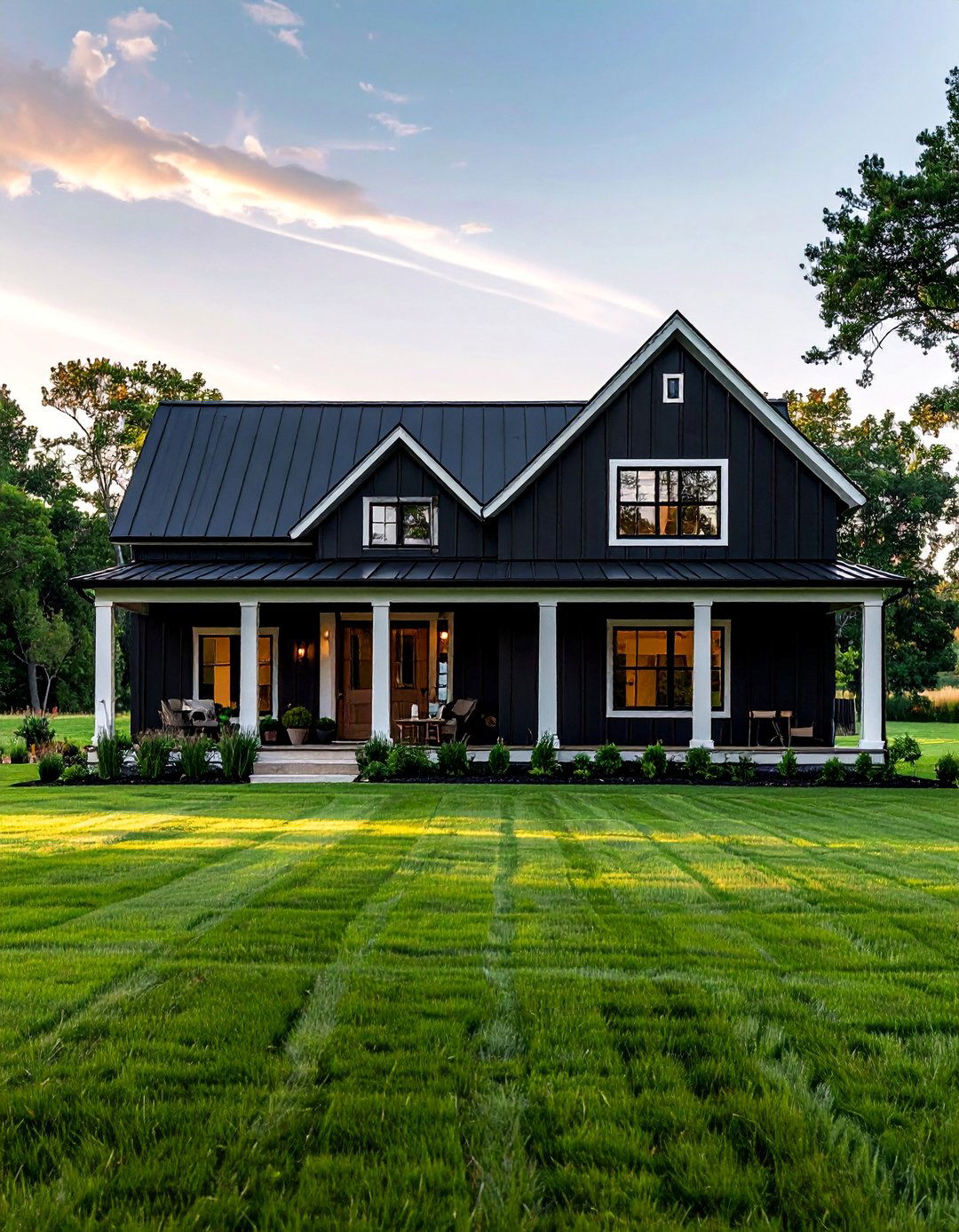
A modern farmhouse with black vertical siding creates a striking silhouette that blends rustic charm with contemporary flair. The vertical lines draw the eye upward, making the home appear taller and more stately. This siding choice is often paired with a crisp white trim around windows and doorways to create a classic, high-contrast look that feels both fresh and timeless. To complete the aesthetic, a standing seam metal roof in a complementary dark gray or black is frequently used. Natural wood elements, such as porch columns or a front door, add warmth and texture, balancing the boldness of the black siding.
2. Black Horizontal Lap Siding for a Traditional Home
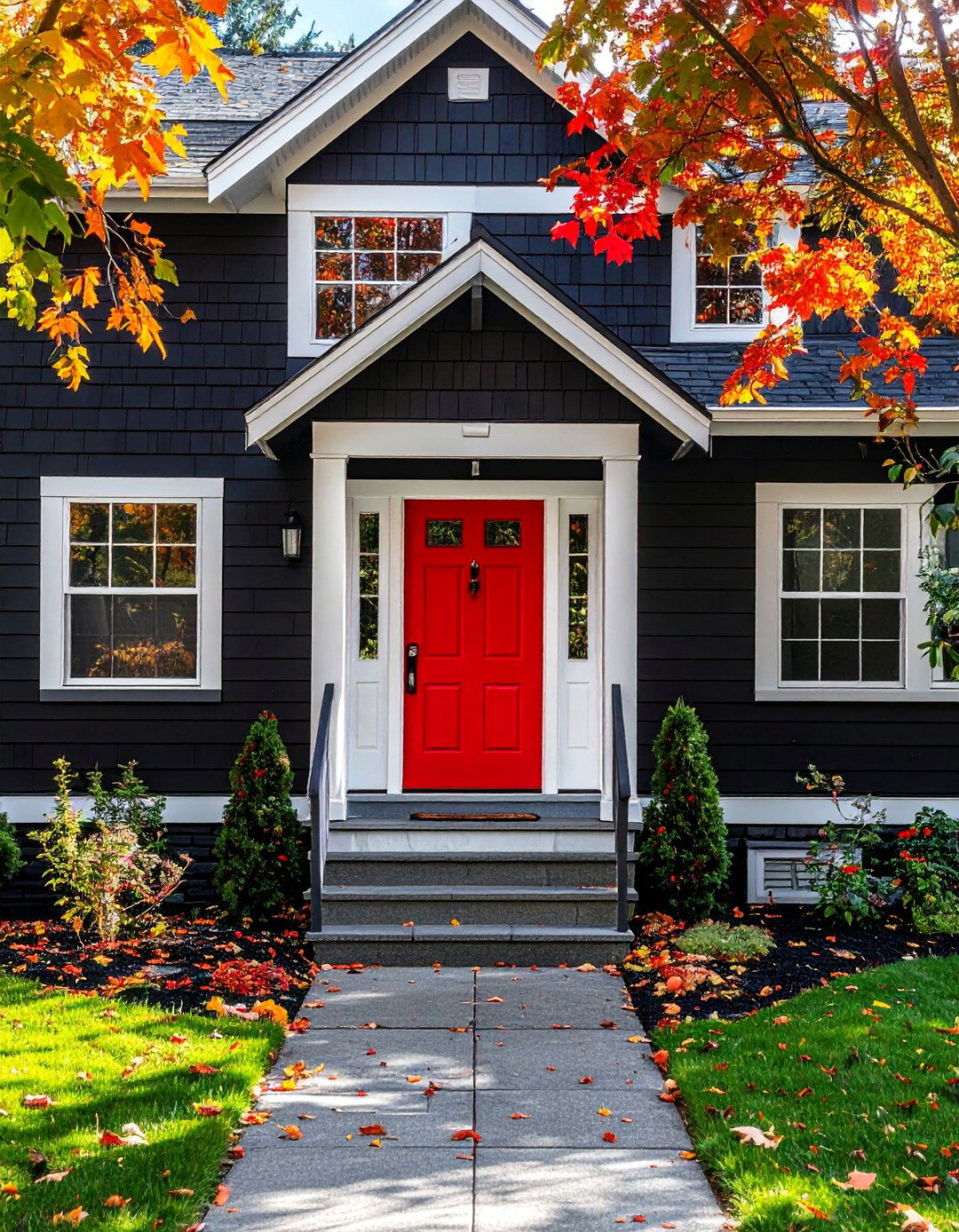
For those who appreciate classic architecture, black horizontal lap siding offers a sophisticated update to a traditional home. This timeless siding style, when rendered in a deep black, provides a sense of substance and elegance. The overlapping boards create subtle shadow lines that add depth and character to the facade. Paired with wide, white window casings and a brightly colored front door, the look is both welcoming and stately. This approach works exceptionally well on Colonial or Cape Cod style homes, preserving their historic charm while infusing them with a modern, confident edge that stands out in any neighborhood.
3. Black Siding with Natural Wood Accents
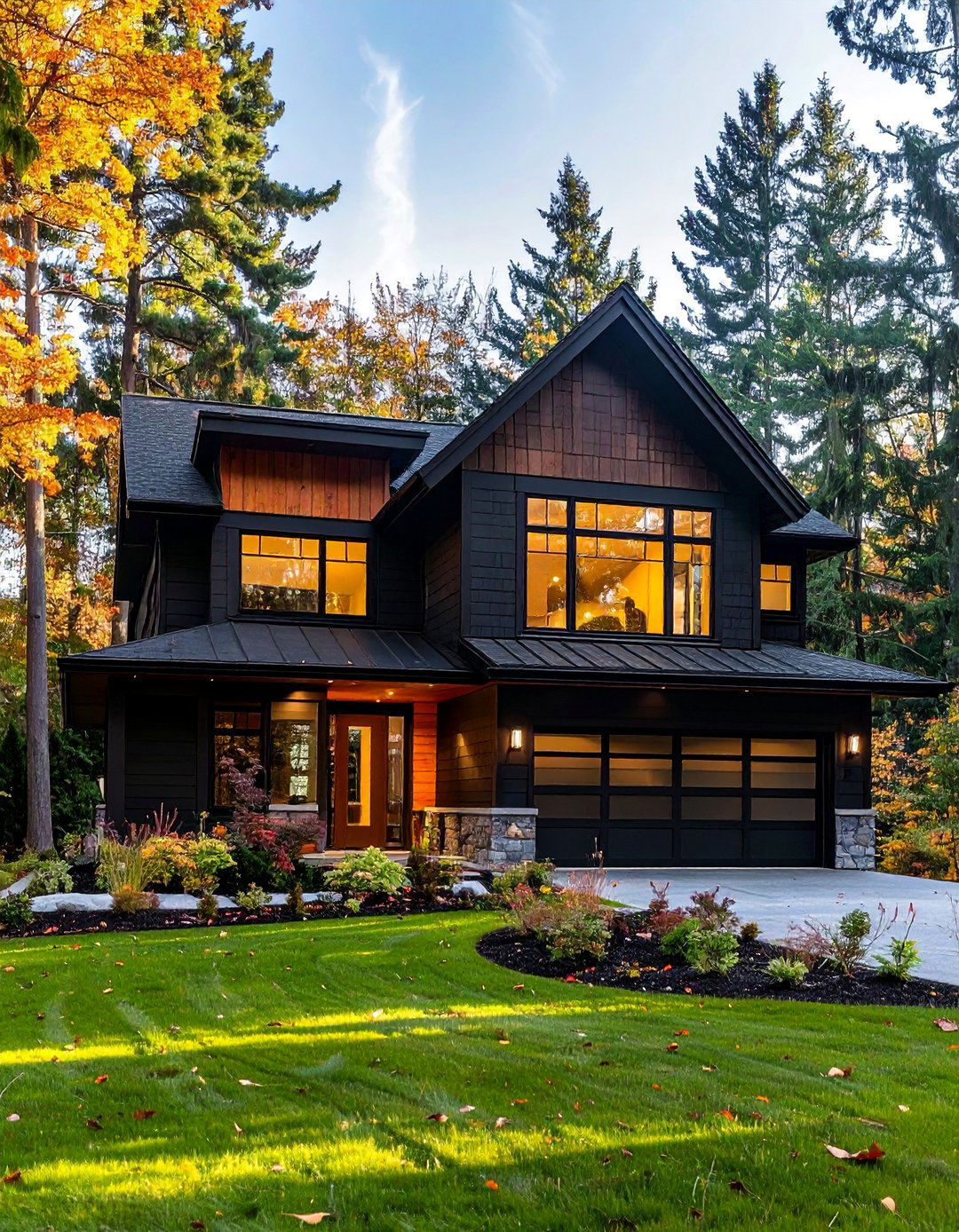
Combining black siding with natural wood accents is a popular way to create a warm and inviting exterior. The richness of wood, whether it's cedar, oak, or redwood, provides a stunning organic contrast to the sleek, uniform nature of the black siding. These wood elements can be incorporated as soffits, porch ceilings, garage doors, or decorative rain screens. The warmth of the wood grain prevents the black facade from feeling too stark, resulting in a balanced design that feels connected to nature. This combination is particularly effective for homes in wooded or rustic settings, harmonizing with the surrounding landscape.
4. Black Siding with Stone Veneer Foundation
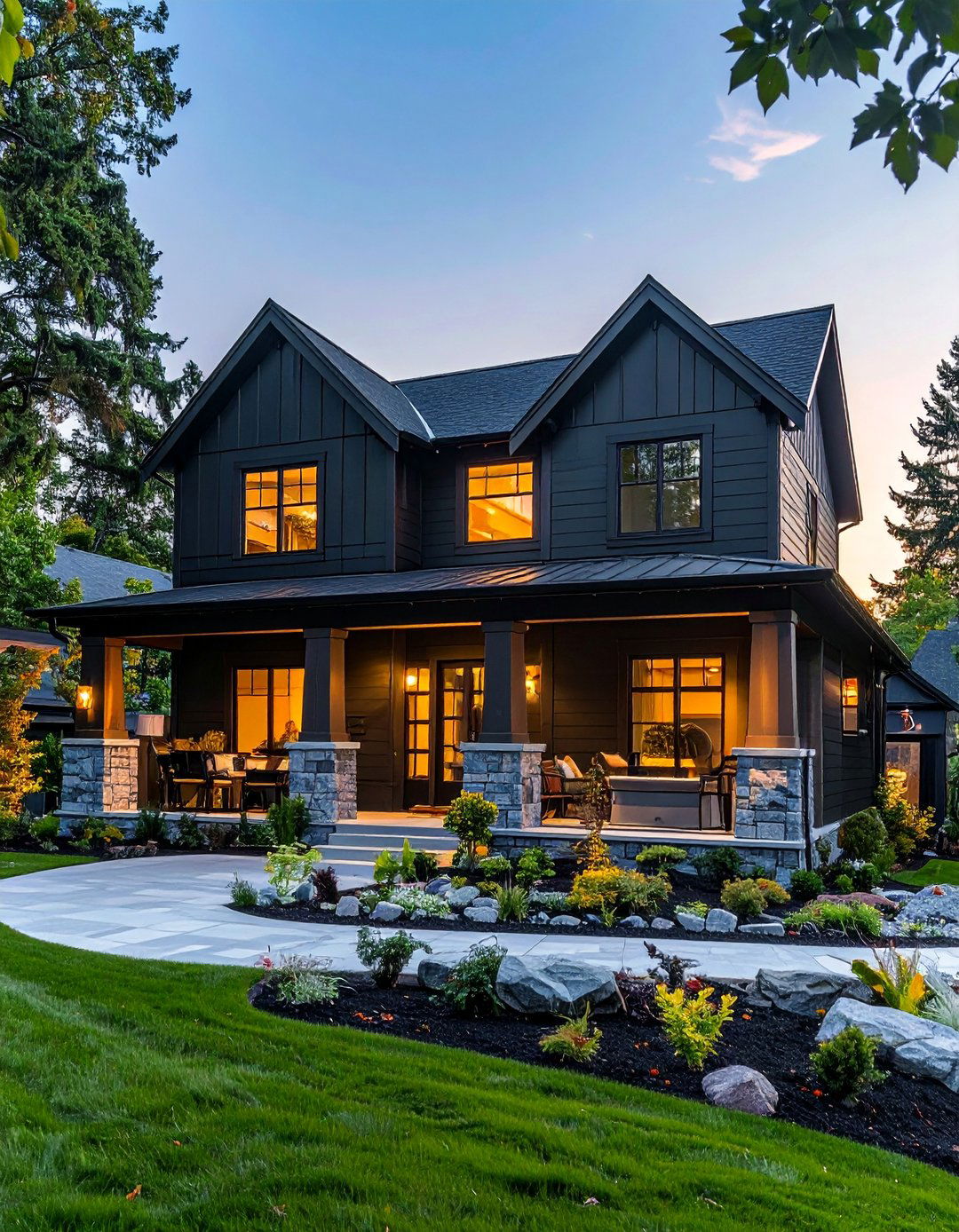
Pairing black siding with a stone veneer foundation creates a look of permanence and textural richness. The rugged, earthy quality of the stone provides a grounding element that beautifully complements the modern sleekness of the black panels. This combination works well with various stone types, from cool-toned slate to warmer, multi-colored fieldstone. The stone can be used to wrap the foundation of the house, cover porch columns, or create an accent wall around the entryway. This material pairing adds significant curb appeal and an upscale feel, blending contemporary design with timeless, natural materials for a truly distinguished appearance.
5. All-Black Siding House with a Black Roof
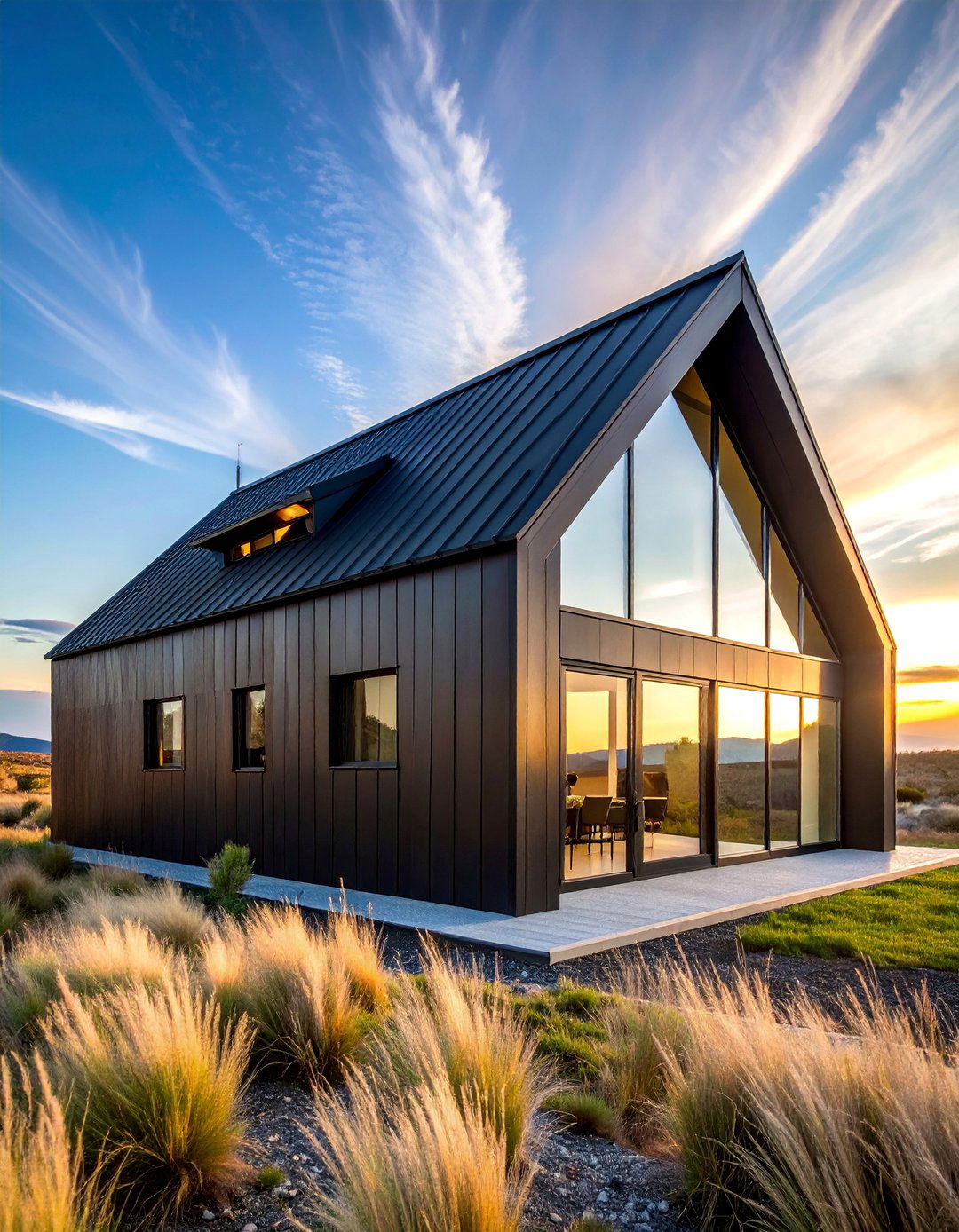
An all-black siding house with a matching black roof delivers a powerful, monolithic statement of modern design. This bold, monochromatic approach emphasizes the home's architectural form and silhouette above all else. The lack of color variation creates a seamless, sculptural quality that is both dramatic and incredibly sophisticated. To prevent the design from feeling flat, it's crucial to incorporate different textures, such as matte siding with a glossy metal roof or varied siding profiles. Large windows are key to this style, as they break up the dark facade and reflect the surrounding environment, adding light and life to the exterior.
6. Black Siding Paired with a Brightly Colored Front Door
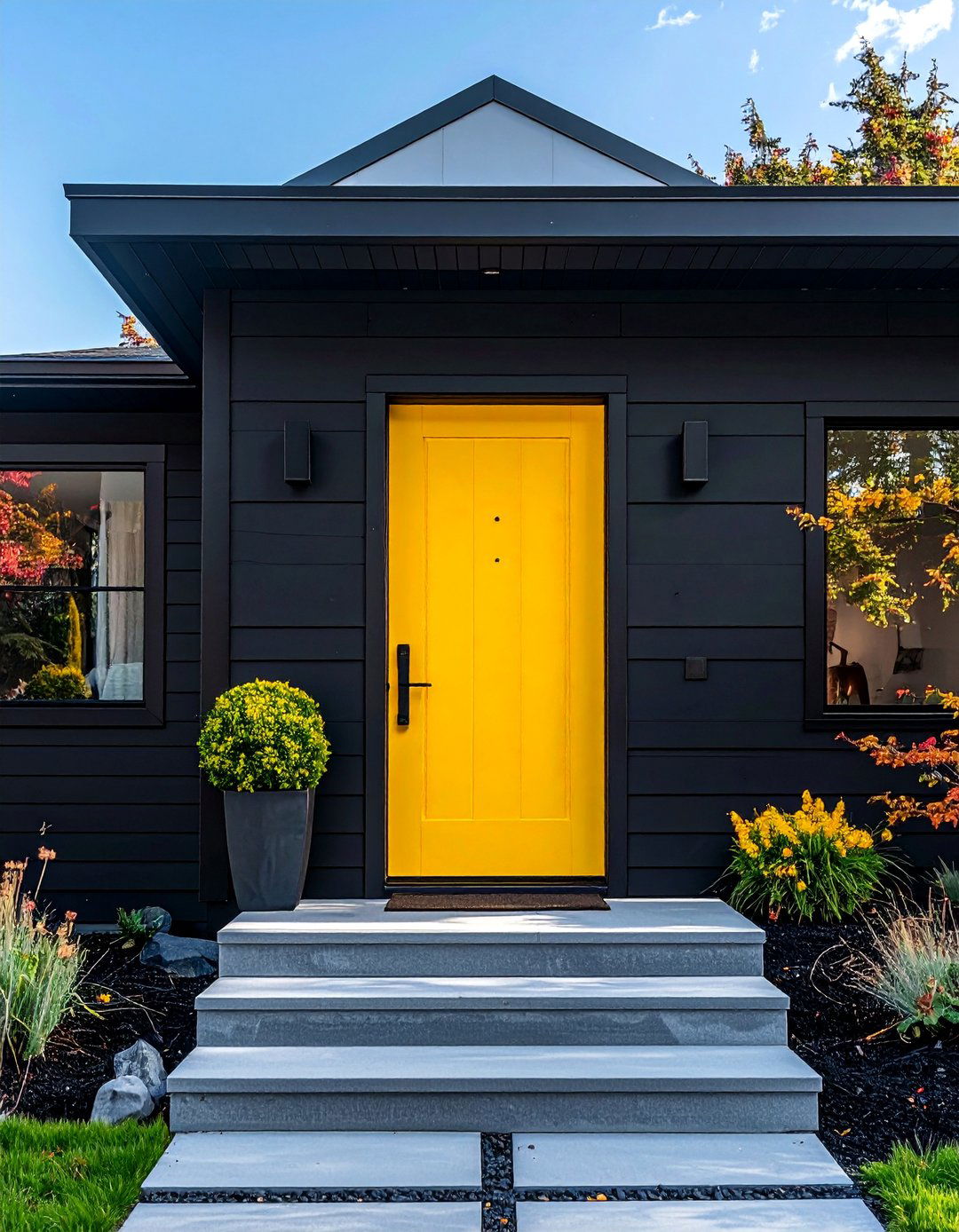
Using a brightly colored front door on a black siding house creates an immediate and welcoming focal point. The dark, neutral canvas of the siding makes any vibrant color pop, drawing the eye directly to the entrance. A cheerful yellow, a bold red, a cool turquoise, or even a zesty lime green door can inject personality and a sense of playfulness into the otherwise serious facade. This simple design choice is highly effective for adding a personal touch and enhancing curb appeal. It signals a sense of confidence and creativity, making the home feel both stylish and approachable from the street.
7. Black Siding on a Contemporary Gable-End House
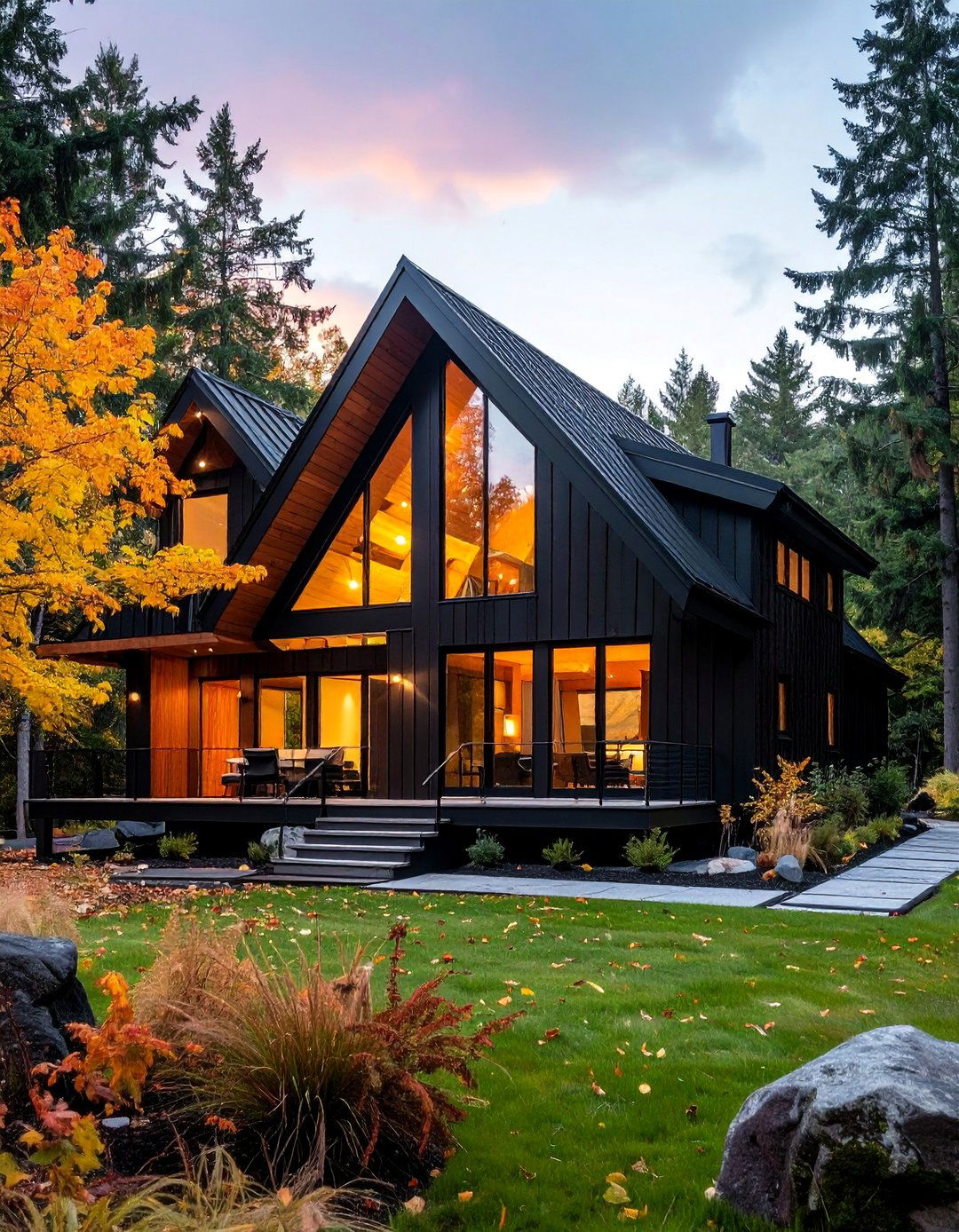
Applying black siding to a contemporary house with prominent gable ends accentuates its clean lines and geometric purity. The dark color unifies the different planes of the roof and walls, creating a cohesive and sculptural form. This is especially effective on A-frame structures or modern homes that feature multiple intersecting gables. The black siding acts as a canvas, allowing the architectural shape itself to be the main feature. Often combined with large expanses of glass, this design allows the interior to feel connected to the outdoors while the exterior maintains a powerful, minimalist presence in the landscape.
8. Black Siding with White Trim and Windows
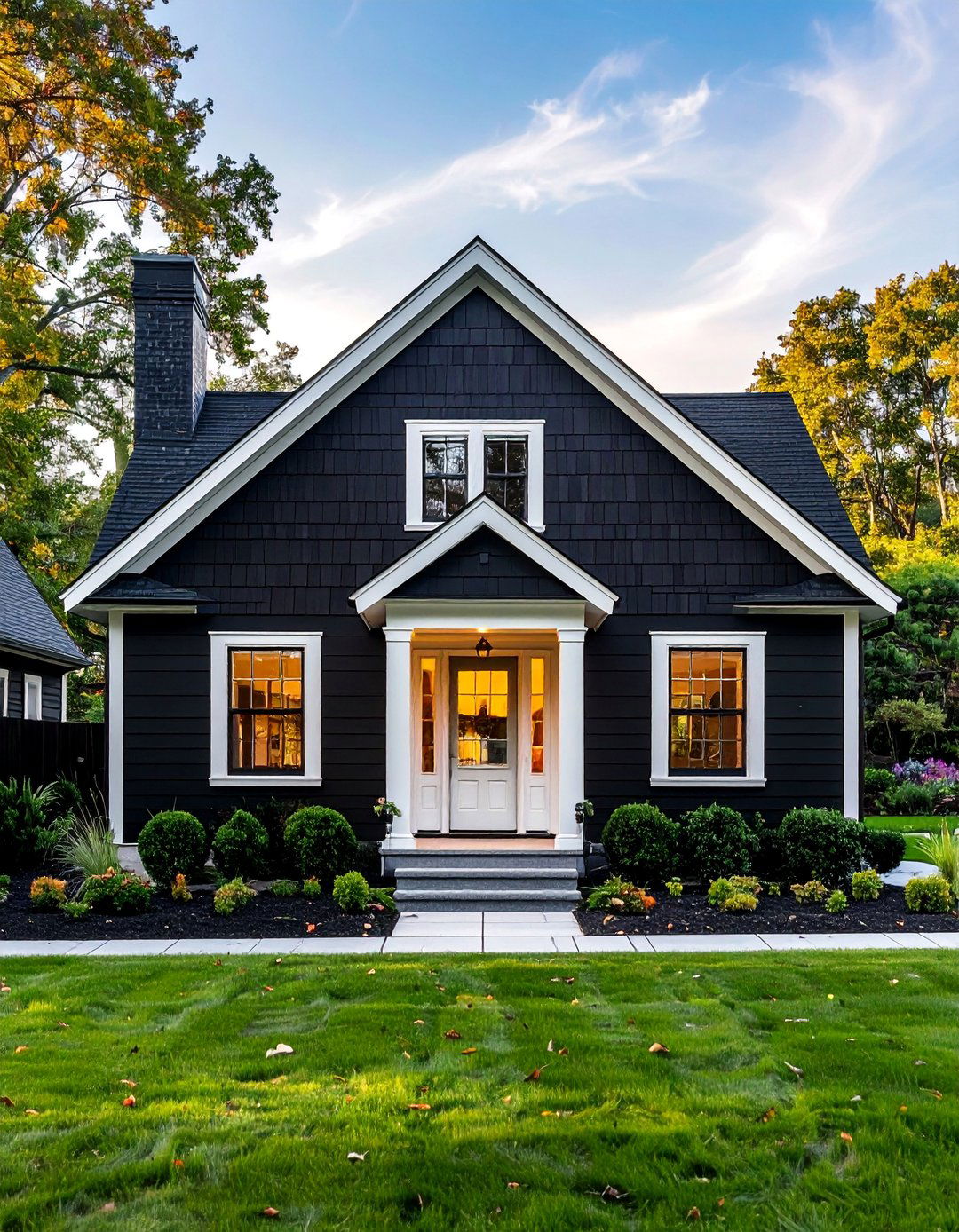
The classic combination of black siding with crisp white trim and windows is a foolproof choice for a timeless and elegant exterior. This high-contrast palette delivers a sharp, clean look that highlights the home's architectural details. The white trim acts as a frame, clearly defining the windows, doors, fascia, and corners, preventing the dark siding from overwhelming the design. This look is versatile and suits a wide range of architectural styles, from traditional farmhouses to more contemporary builds. It’s a sophisticated and polished aesthetic that never goes out of style, offering a perfect balance between bold drama and classic refinement.
9. Mixed Materials: Black Siding with Corrugated Metal Panels
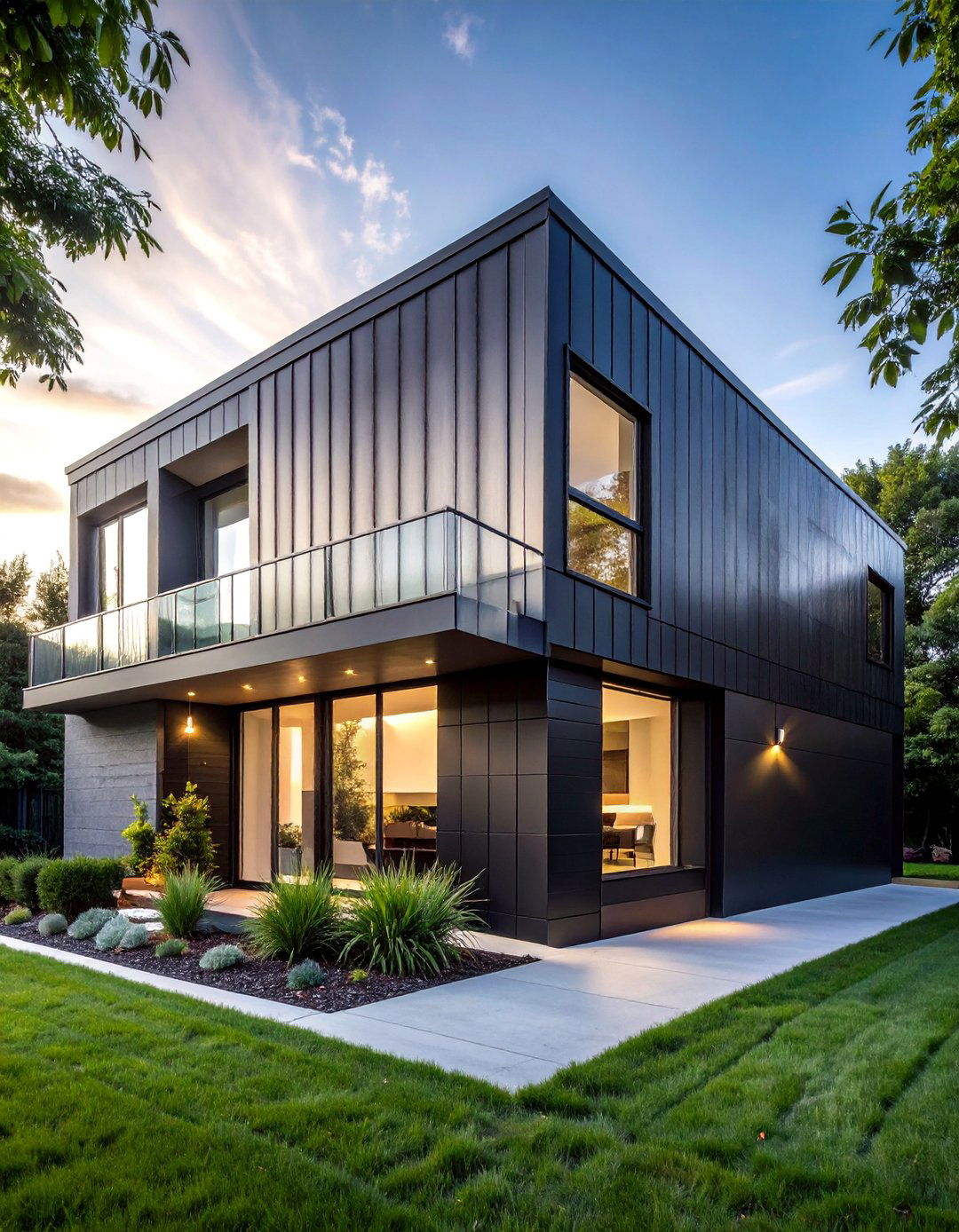
For an industrial-chic aesthetic, pairing black siding with corrugated metal panels offers a unique blend of textures and finishes. The sleek, smooth surface of the black siding contrasts sharply with the utilitarian, ribbed texture of the metal. This combination can be used to define different sections of the house, such as accenting a garage, an entryway, or a second-story addition. The metal can be left in its raw galvanized state for a rustic look or painted a complementary charcoal gray or even a contrasting color for a more modern effect. This pairing creates a durable, low-maintenance exterior with a distinctively edgy and contemporary appeal.
10. Black Siding on a Split-Level Home
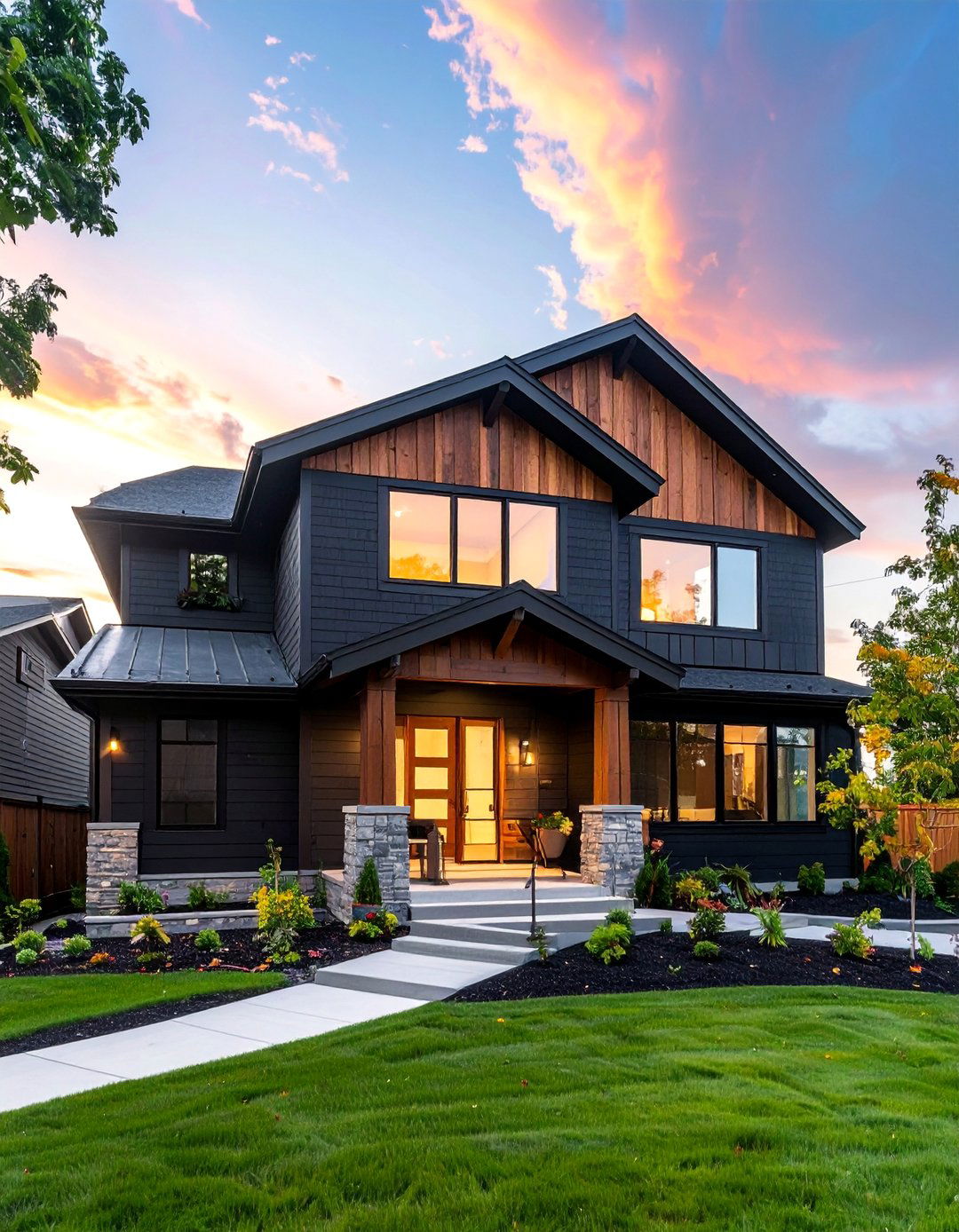
Using black siding on a split-level home can modernize its often-dated appearance and unify its distinct levels into a cohesive whole. The continuous dark color helps to streamline the staggered floors, creating a more integrated and visually appealing facade. By cladding the entire exterior in black, the sometimes awkward transitions of a split-level design become less pronounced, resulting in a sleeker, more contemporary silhouette. Accenting with wood tones around the entrance or on a balcony can add warmth and a focal point. This approach is a powerful way to update the architecture and give it a sophisticated, modern identity.
11. Black Siding with Copper Gutters and Downspouts
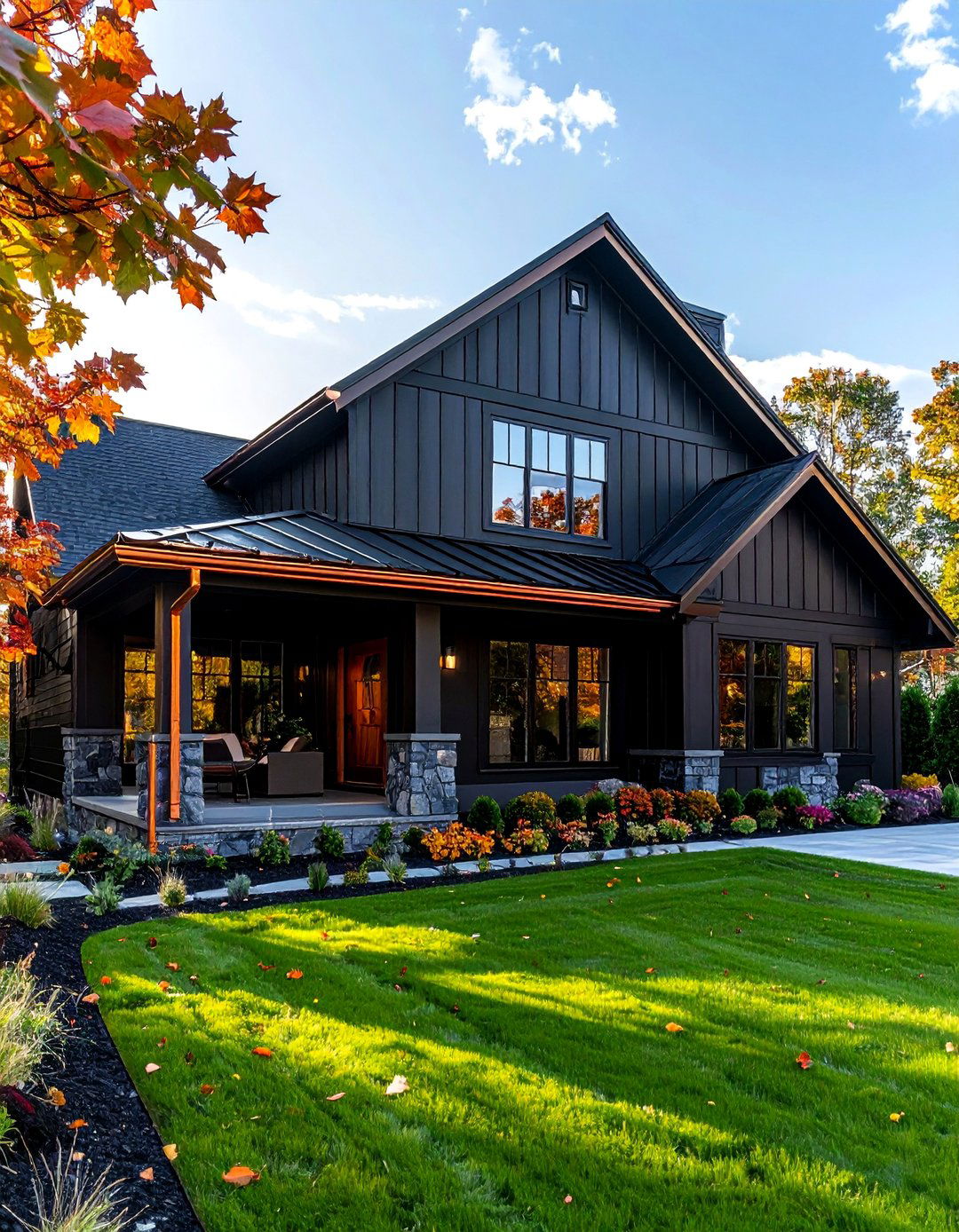
Integrating copper gutters and downspouts with a black siding house introduces an element of luxury and warmth. Over time, the copper develops a beautiful blue-green patina, which provides a stunning, evolving contrast against the deep black siding. Initially, the bright, metallic sheen of new copper offers a striking highlight, catching the light and drawing attention to the roofline. This combination elevates the exterior from simple to sophisticated, adding a touch of old-world elegance to a modern color scheme. It’s a detail that signifies quality craftsmanship and adds a unique, high-end finish to the home's overall design.
12. Black Siding on a Small, Minimalist Cabin
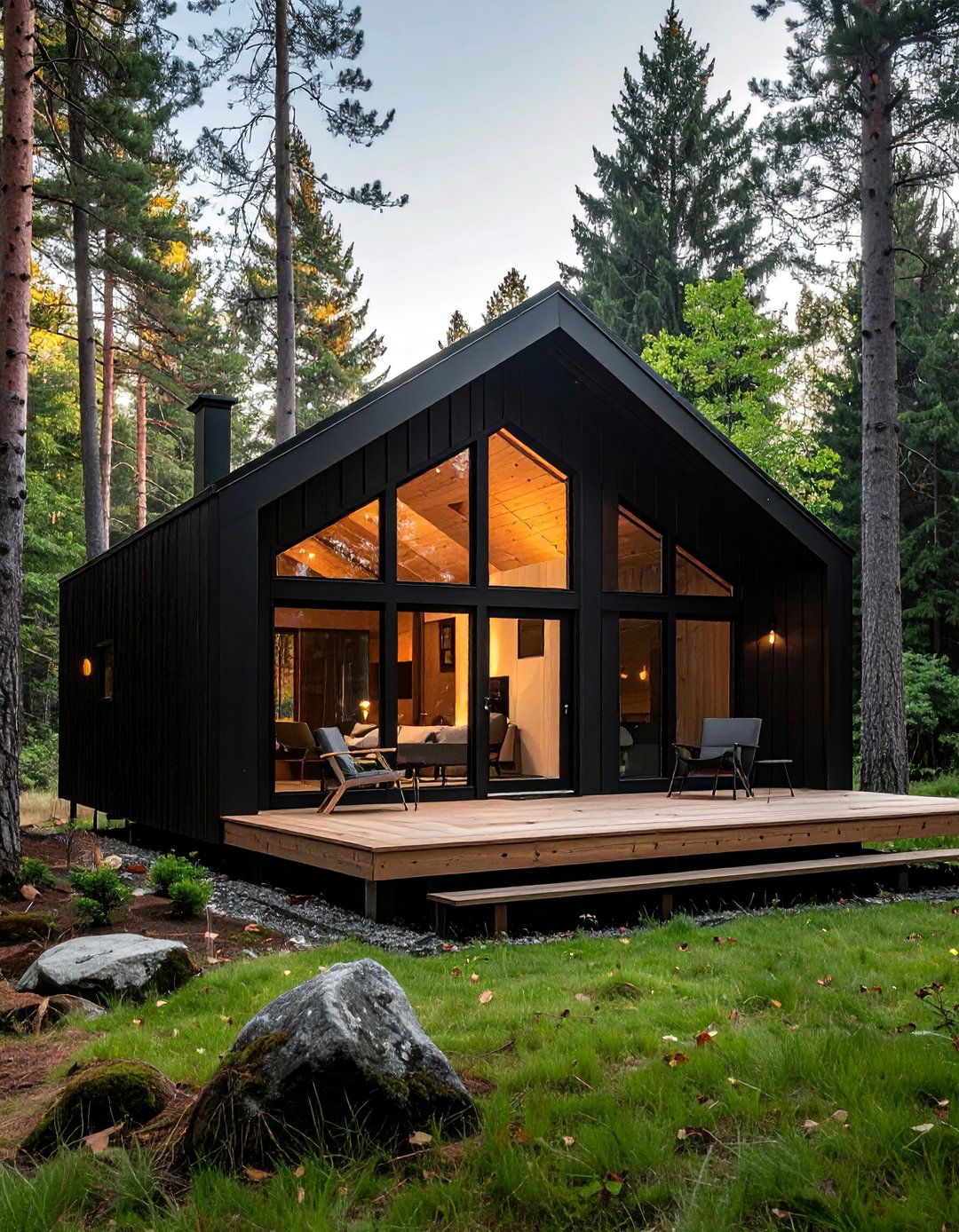
A small, minimalist cabin clad in black siding can create a dramatic and intimate retreat that blends seamlessly into a natural setting. The dark exterior helps the structure recede into the shadows of a forest, minimizing its visual impact on the landscape. This allows the natural surroundings, viewed through large picture windows, to take center stage. The simplicity of the black siding complements the minimalist architectural form, emphasizing clean lines and a connection to nature. Often paired with a simple metal roof and a small wooden deck, a black cabin feels both cozy and incredibly modern, a perfect hideaway from the world.
13. Black Board and Batten Siding Exterior
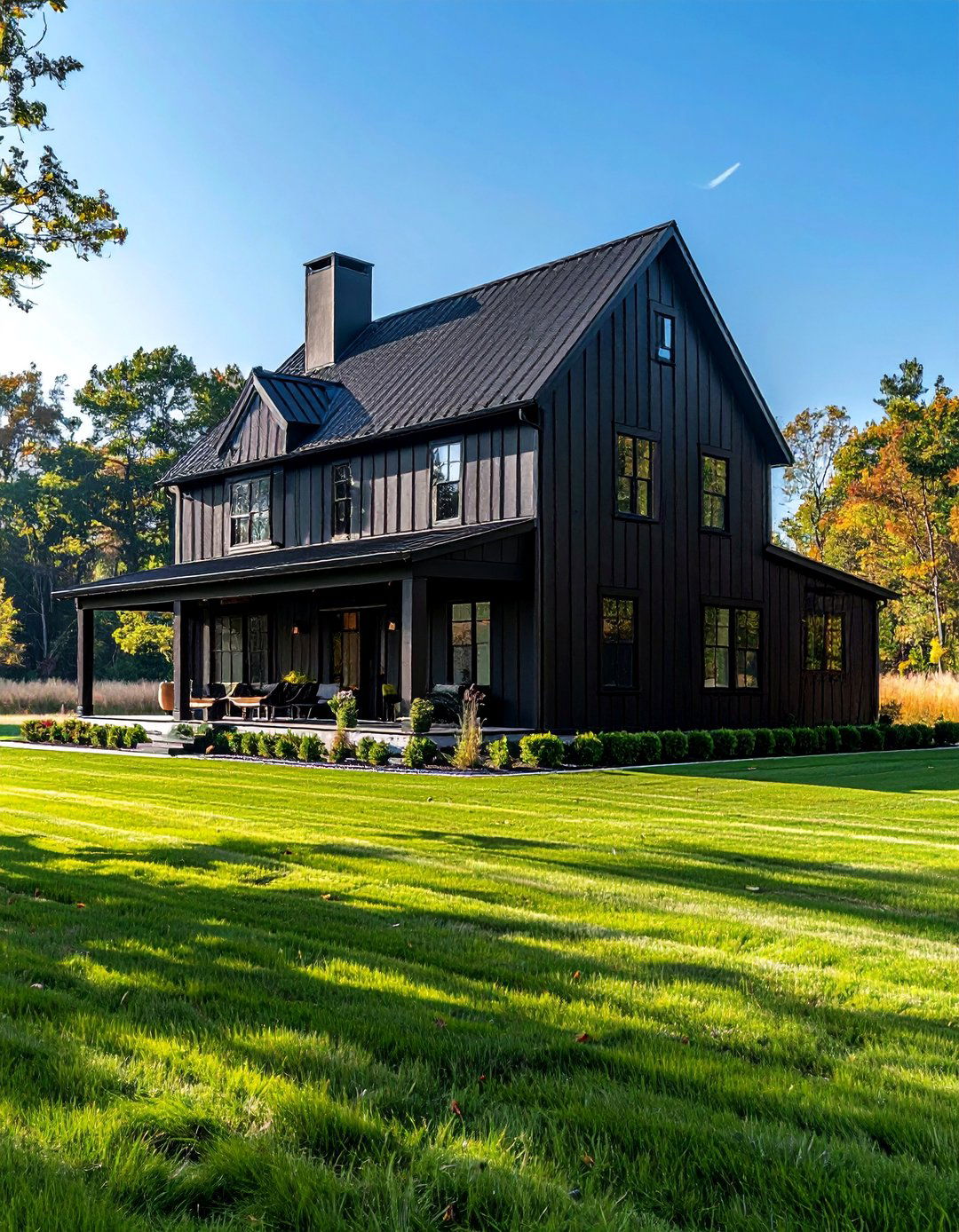
Black board and batten siding provides a textured, rhythmic facade that adds depth and character to any home. This style, with its wide vertical boards and narrow overlying strips (battens), creates strong vertical lines and appealing shadow play. When finished in black, the effect is both rustic and modern. It’s a popular choice for modern farmhouses and transitional-style homes, as it references traditional building techniques while feeling completely contemporary. The texture prevents the dark color from appearing flat, giving the exterior a dynamic and visually interesting surface that changes with the light throughout the day.
14. Black Siding with Large Picture Windows
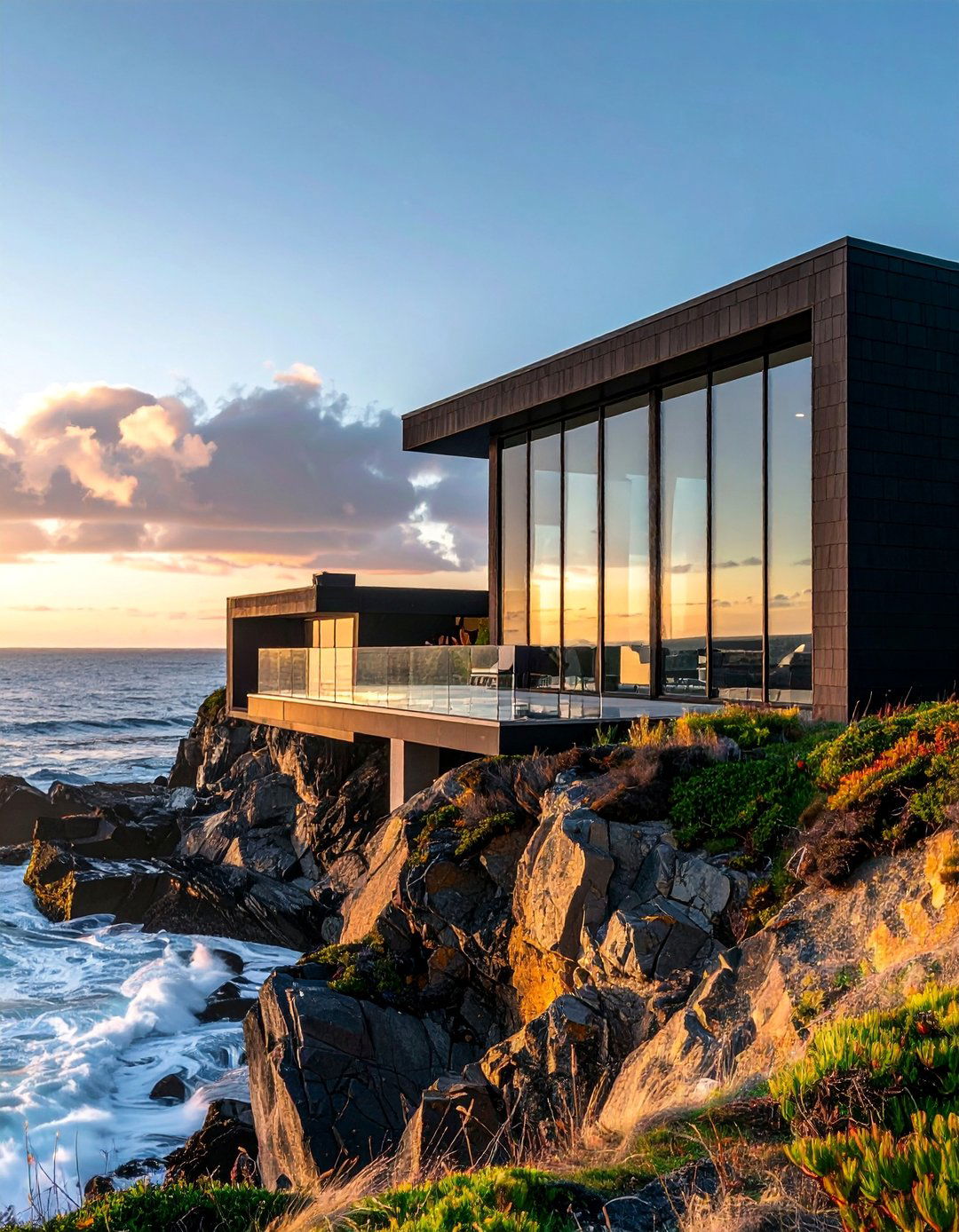
A black siding house designed with large picture windows creates a stunning interplay between interior and exterior spaces. The dark, solid siding acts as a bold frame, making the views through the expansive glass even more vibrant and impactful. From the outside, the windows reflect the sky and surrounding landscape, breaking up the dark mass of the walls and adding a dynamic, reflective quality. This design choice is ideal for homes with beautiful scenery, as it prioritizes the connection to nature. The contrast between the dark, protective shell of the house and the transparent, open windows is a hallmark of contemporary architecture.
15. Black Siding on a Mid-Century Modern Home

Updating a mid-century modern home with black siding can enhance its iconic architectural features. The clean lines, flat planes, and geometric forms characteristic of this style are beautifully accentuated by a dark, uniform color. Black siding helps to unify the different elements of the facade, such as clerestory windows and integrated carports, into a cohesive and sophisticated statement. Paired with the warm tones of original walnut or teak wood details and perhaps a brightly colored door, the black siding brings a fresh, contemporary relevance to the classic mid-century aesthetic while honoring its minimalist principles and connection to the outdoors.
16. Black Siding Combined with White or Light-Colored Brick
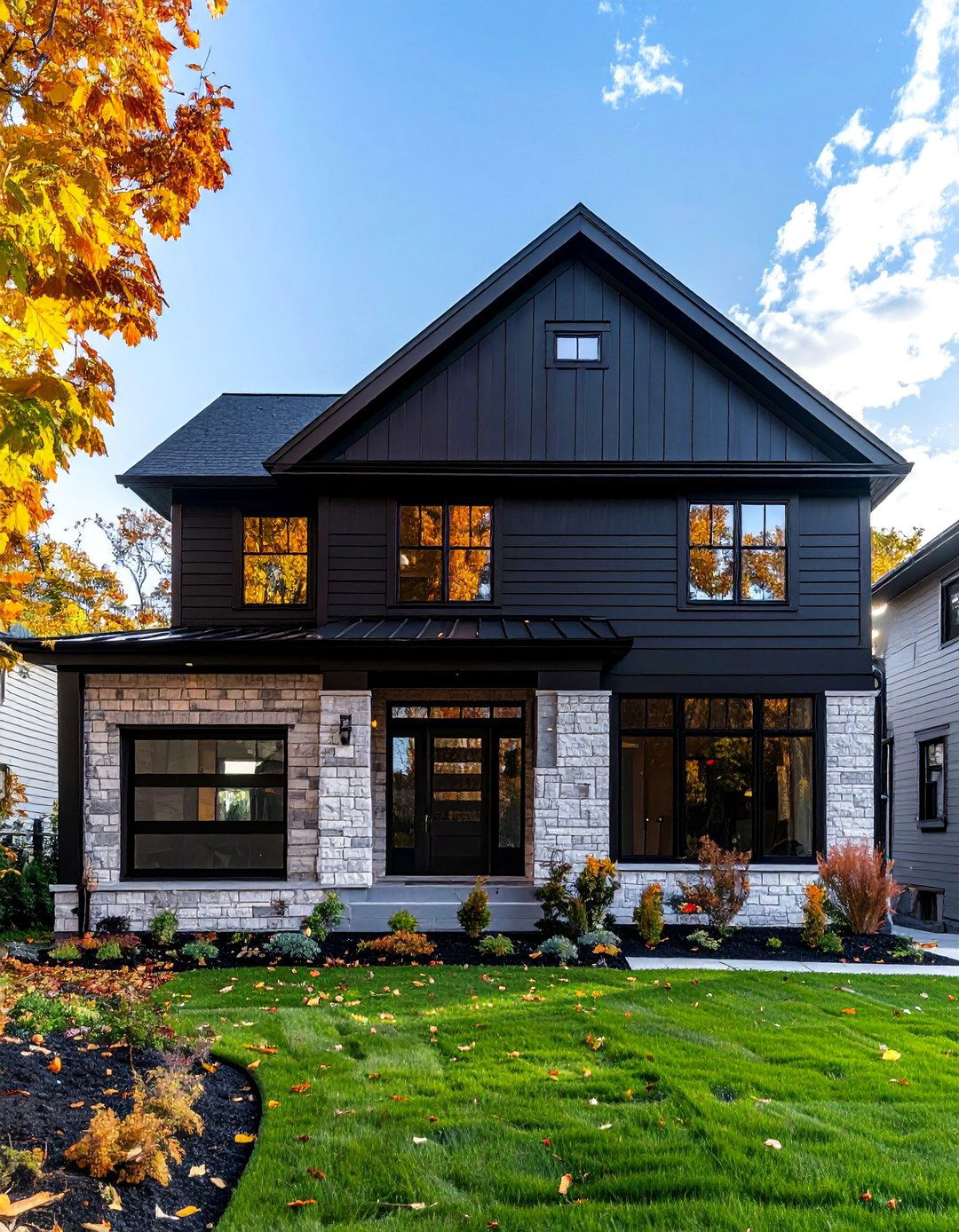
Combining black siding with white or light-colored brick offers a sophisticated and texturally rich exterior. This pairing creates a beautiful dialogue between the smooth, modern feel of the siding and the classic, tactile quality of the brick. The light brick can be used on the lower portion of the house to create a solid-looking base, or as an accent wall around a porch or entryway. The high contrast between the black and white elements produces a clean, graphic look that is both timeless and contemporary. This mix of materials adds depth, interest, and a custom-designed feel to the home's facade.
17. Black Siding with Integrated Exterior Lighting
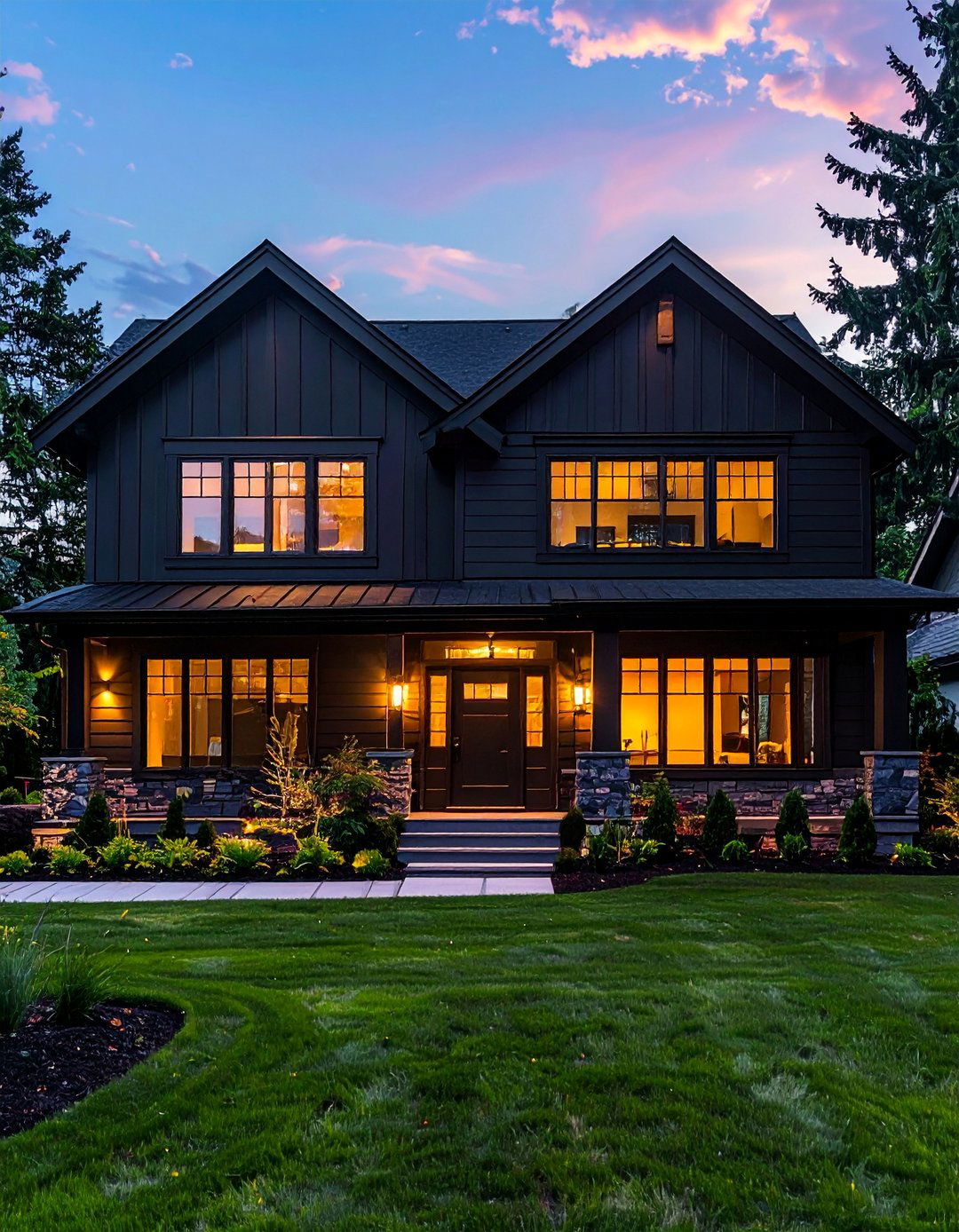
Thoughtfully integrated exterior lighting can dramatically transform a black siding house after sunset. Uplighting can be used to highlight architectural features and create dramatic shadows, emphasizing the texture of the siding. Wall sconces placed strategically around doorways and windows provide both functional illumination and a warm, welcoming glow. Concealed linear LED strips tucked under eaves or along pathways can add a sleek, modern touch. The dark siding becomes a perfect canvas for these lighting effects, as the points of light stand out brilliantly against the dark backdrop, enhancing the home's curb appeal and creating a captivating nighttime presence.
18. Black Siding on a Coastal or Beach House
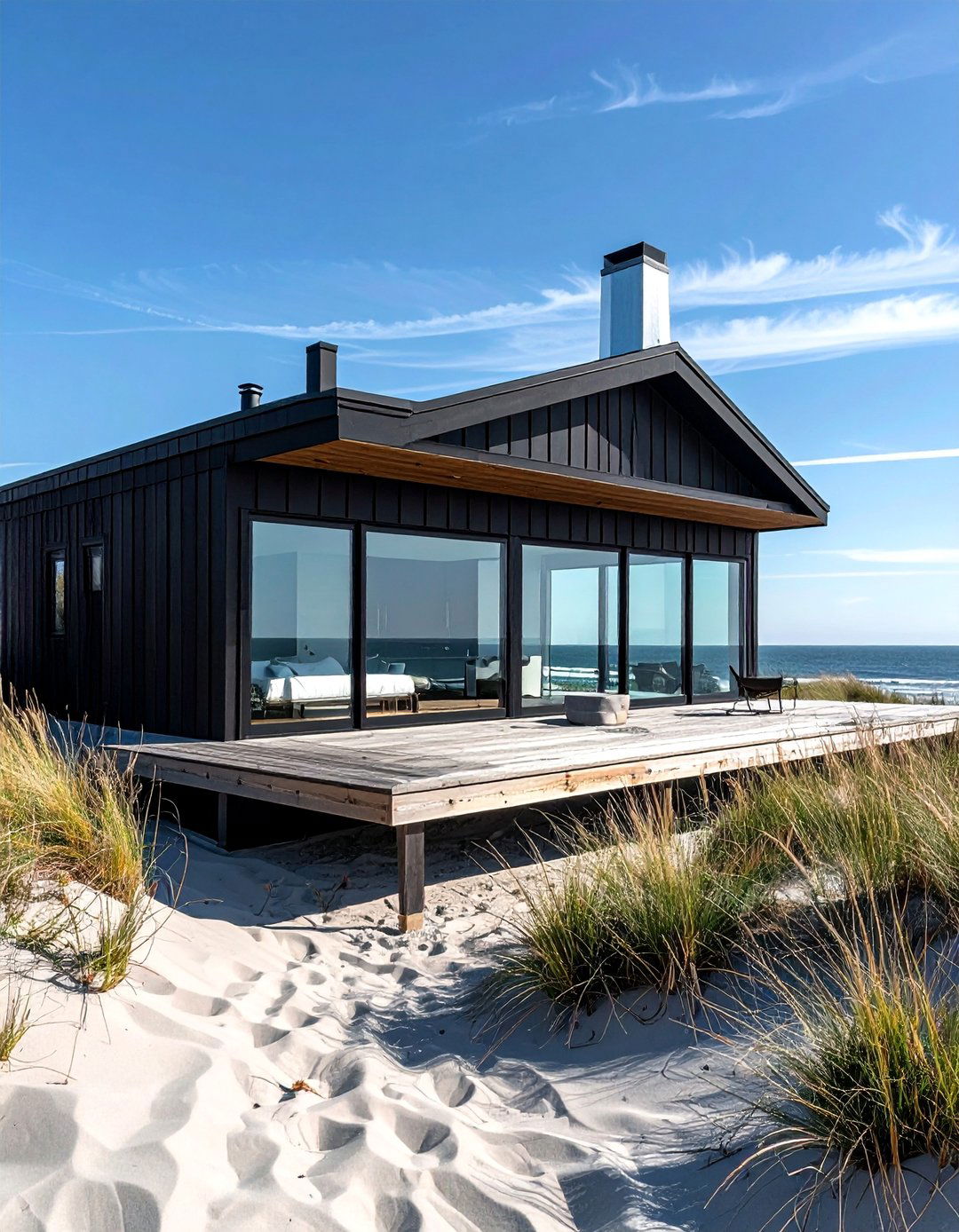
While unconventional, black siding on a coastal or beach house creates a stunningly chic and dramatic statement. Contrasted against the bright sand, blue water, and vibrant sky, a black exterior stands out with sophisticated confidence. This choice defies the traditional palette of light and airy beach colors, offering a bold, contemporary alternative. Paired with natural wood decking, large windows to capture the views, and durable, corrosion-resistant hardware, a black coastal home feels both protected and stylish. It’s a design that feels grounded and strong, offering a unique and memorable presence along the shoreline.
19. Black Siding on a Two-Story Colonial House
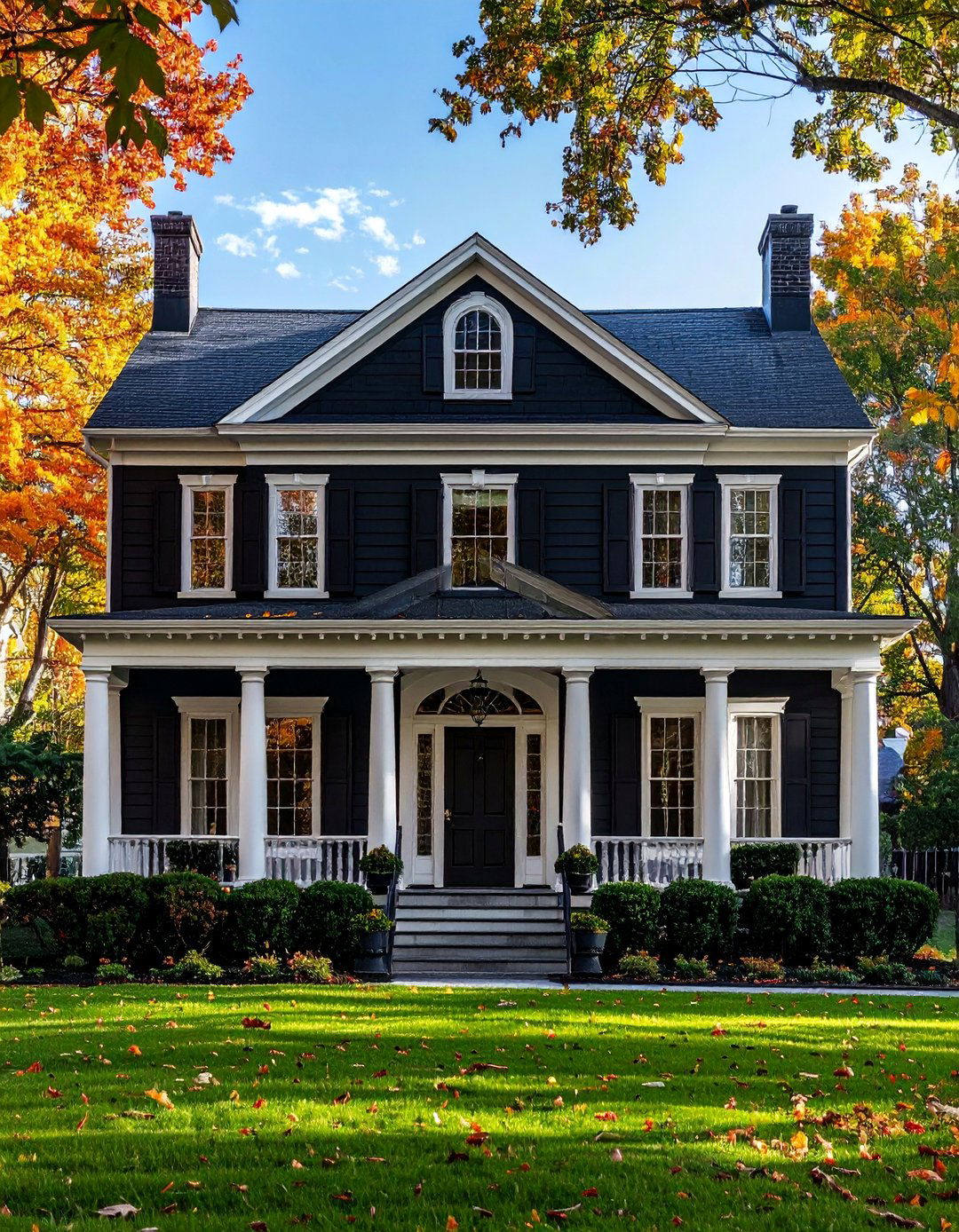
Applying black siding to a classic two-story Colonial house is a powerful way to merge traditional symmetry with modern sensibility. The formal, balanced architecture of the Colonial style, with its evenly spaced windows and central doorway, provides a perfect canvas for this bold color choice. When paired with crisp white trim for the windows, columns, and cornices, the home's historic details are sharply defined and celebrated. This high-contrast scheme respects the home's classic proportions while giving it a fresh, updated, and undeniably elegant appearance that feels both grand and contemporary.
20. Black Fiber Cement Siding for Durability
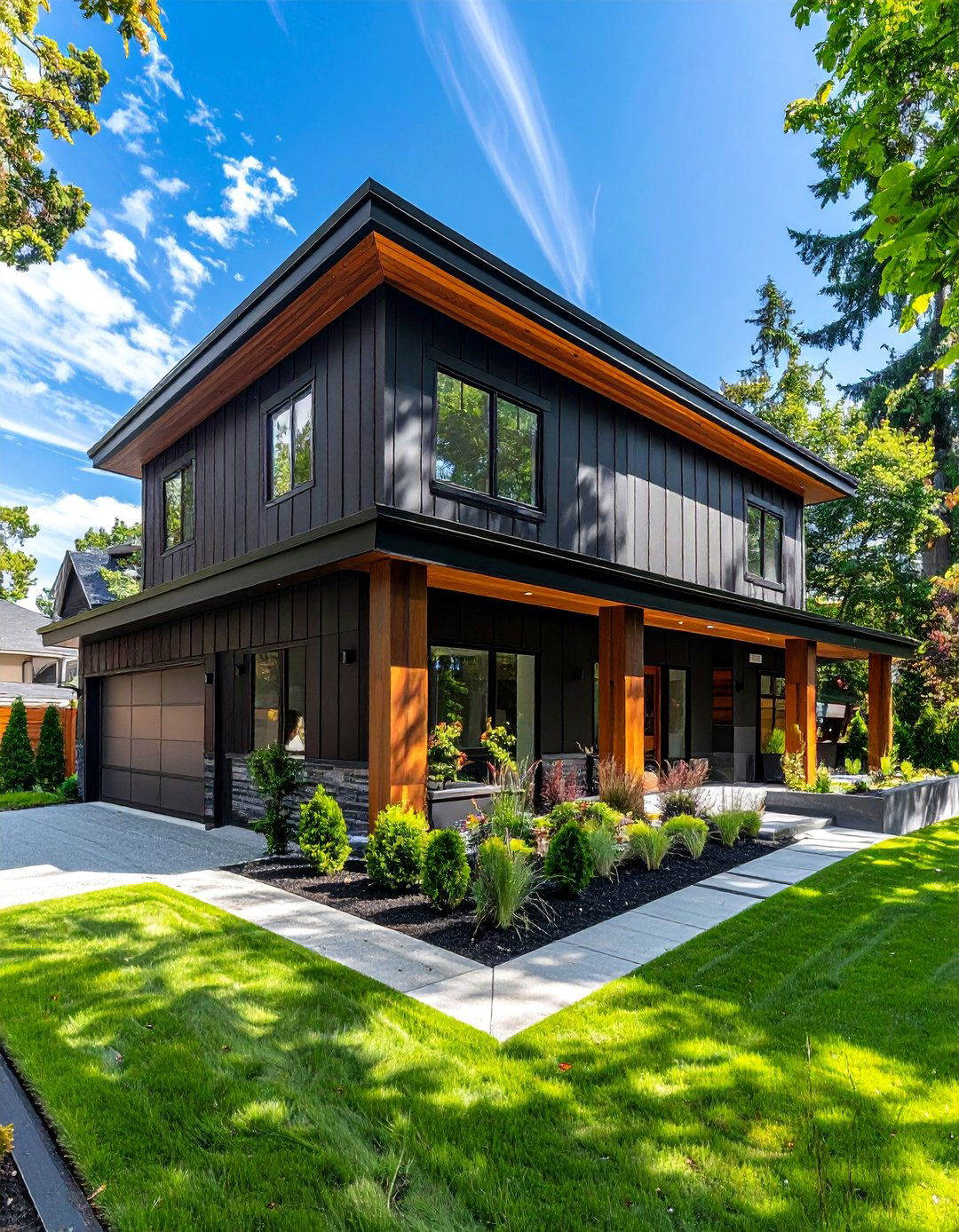
Choosing black fiber cement siding offers both a sleek aesthetic and exceptional durability. This engineered material is resistant to rot, pests, fire, and extreme weather, making it a low-maintenance and long-lasting choice. It comes in a variety of textures, from smooth panels to a realistic wood grain, allowing for design flexibility. The factory-applied black finish is often more fade-resistant than paint, ensuring the home retains its deep, rich color for years to come. For homeowners who want the bold look of a black house without the constant upkeep, fiber cement siding is an intelligent and stylish investment.
21. Black Siding with a Low-Pitched or Flat Roof
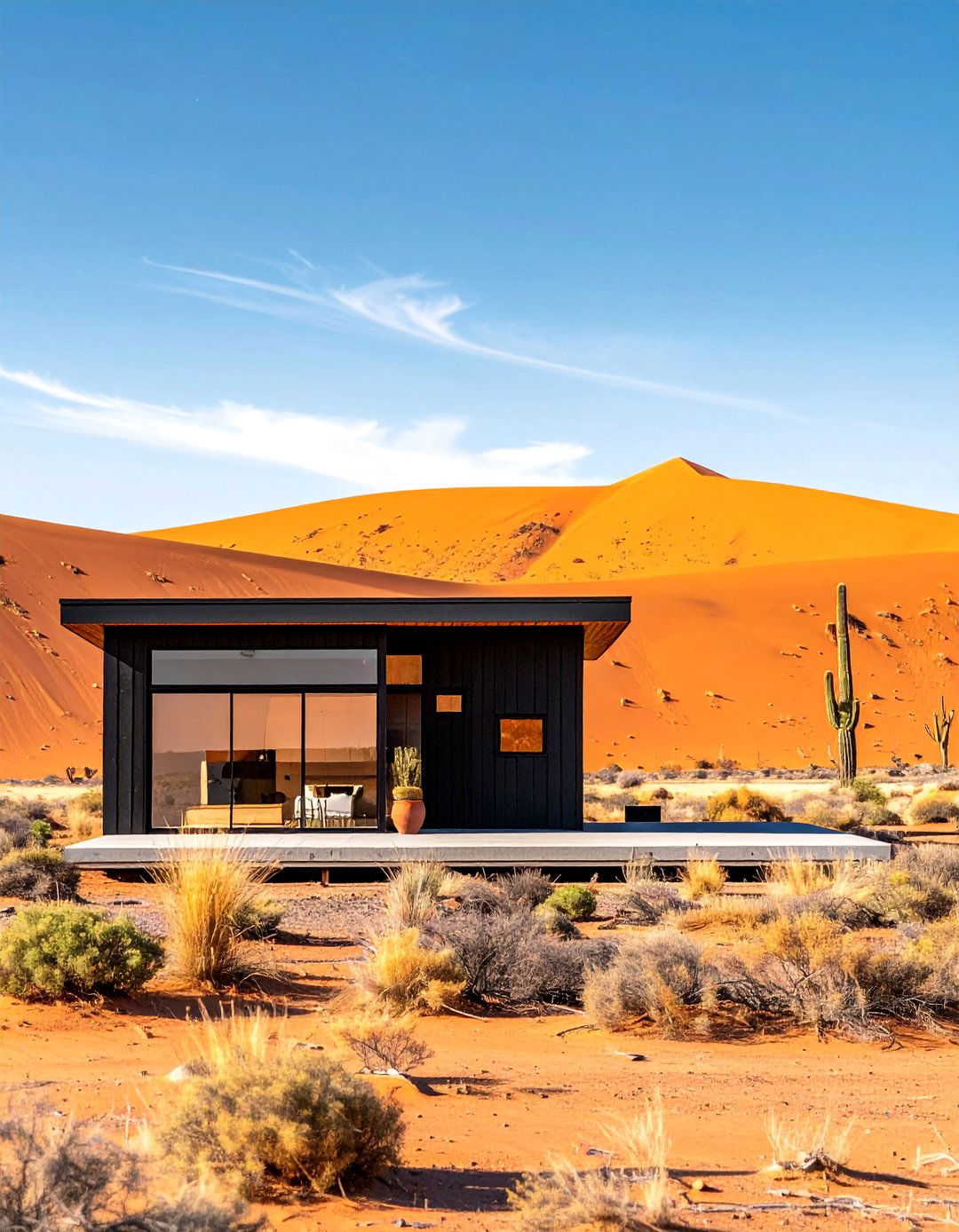
A house with black siding and a low-pitched or flat roof presents a distinctly modern and minimalist profile. This combination is central to many contemporary and international architectural styles, emphasizing horizontal lines and geometric simplicity. The black siding unifies the walls into a single, cohesive volume, while the low roofline keeps the structure grounded and unobtrusive in the landscape. This design is often complemented by large overhangs, which create shadow and protect the home from the elements, and expansive windows that connect the interior living space with the outdoors, achieving a sleek and sophisticated look.
22. Black Siding with Dark Gray Trim for a Subtle Contrast
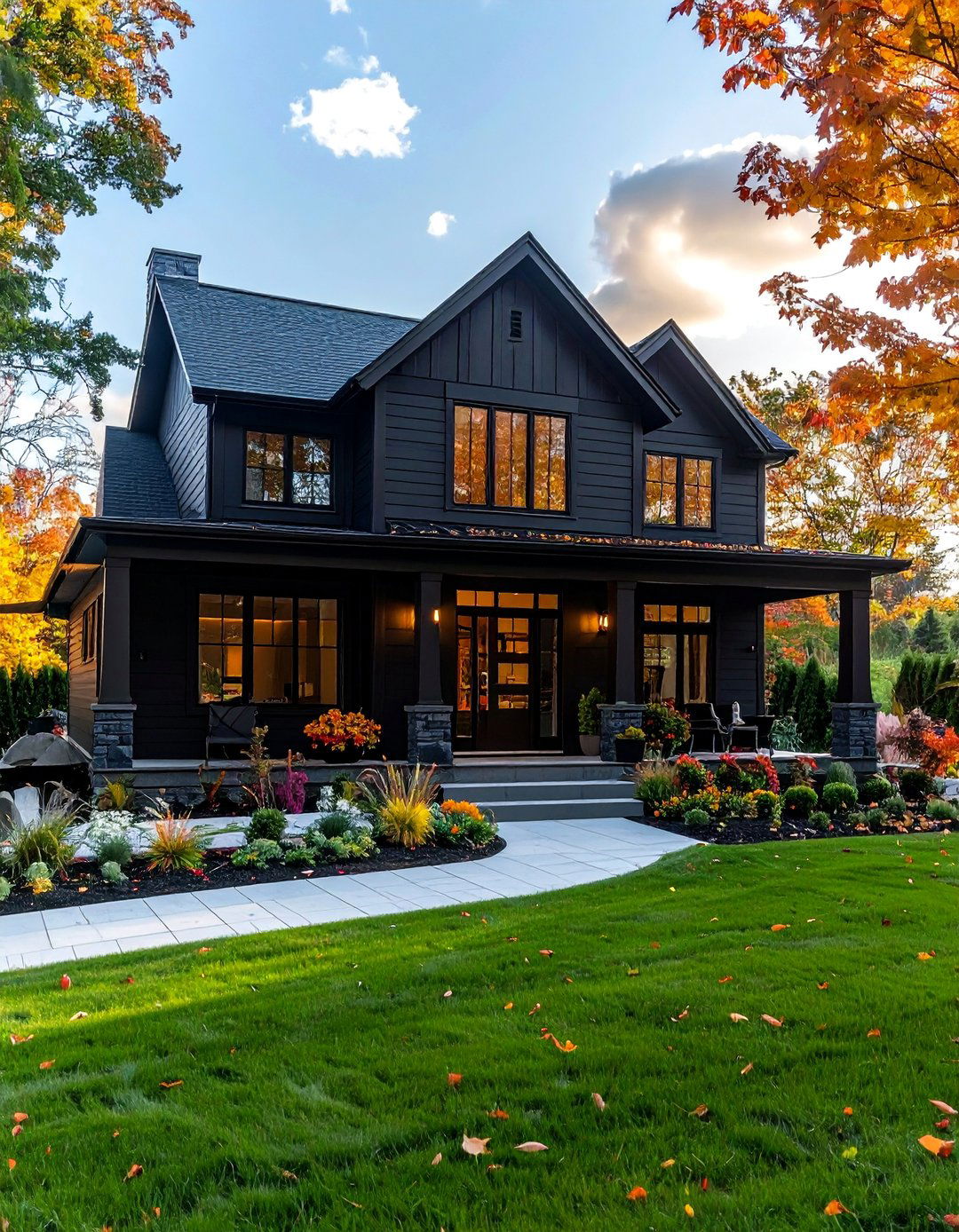
For a more subtle and moody exterior, pairing black siding with dark gray or charcoal trim is an excellent choice. This low-contrast approach creates a sophisticated, cohesive look that is less stark than the traditional black-and-white combination. The slight variation in tone between the siding and the trim provides just enough definition to highlight architectural details without creating a jarring visual break. This monochromatic palette feels modern, elegant, and understated. It works especially well on contemporary homes where the focus is on form and texture rather than color, resulting in a sleek and harmonious facade.
23. Black Siding on an Attached Garage
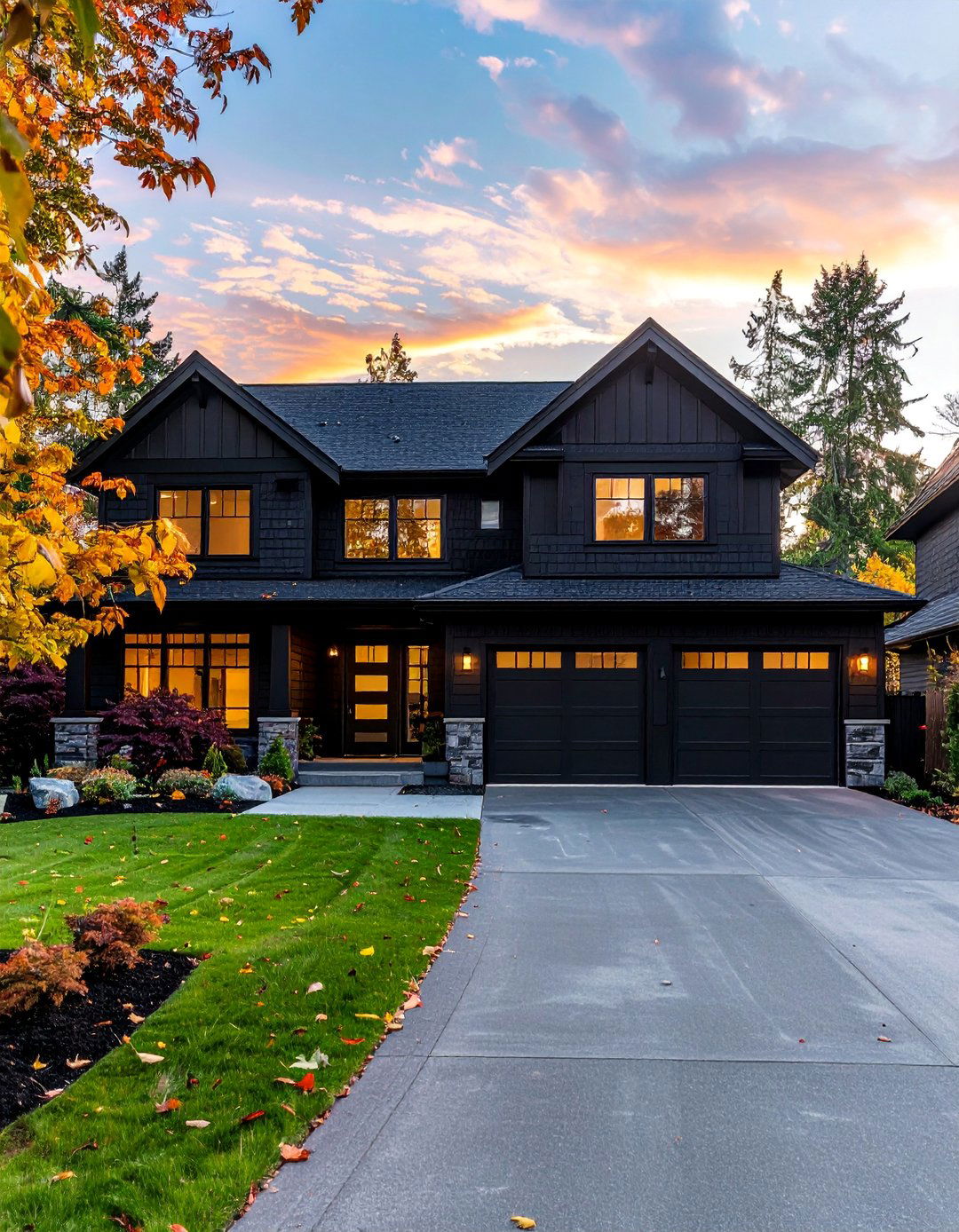
Cladding an attached garage in the same black siding as the main house helps to create a visually unified and cohesive exterior. This is especially important for homes where the garage is a prominent feature of the front facade. Using a single color and material prevents the garage from looking like an afterthought and integrates it seamlessly into the overall architectural design. A black garage door can further enhance this monolithic look, or a natural wood garage door can be used to create a warm and inviting focal point. This strategy results in a cleaner, more intentional, and upscale curb appeal.
24. Black Stained Wood Siding for a Natural Texture
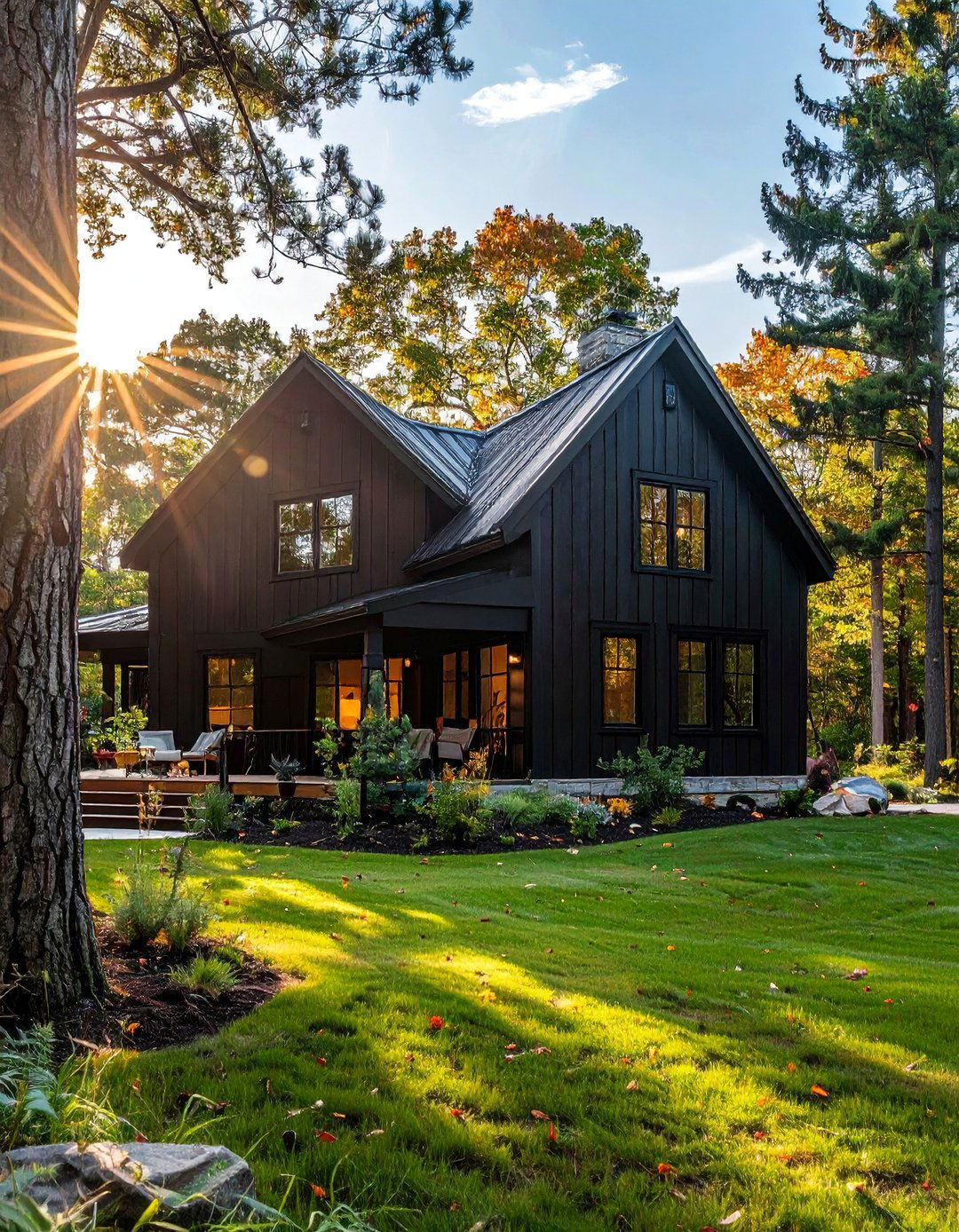
Using black stained wood siding offers the best of both worlds: the bold, modern color of black and the natural beauty and texture of real wood grain. Unlike opaque paint, a black stain allows the unique character of the wood—its knots, lines, and texture—to show through, adding depth and organic richness to the facade. This option is perfect for homes aiming for a rustic-modern or Scandinavian-inspired aesthetic. It feels more connected to nature than a solid painted surface and ages beautifully. Cedar, pine, or thermally modified wood are popular choices for this application, providing both style and durability.
25. Black Siding with an Exposed Concrete Foundation
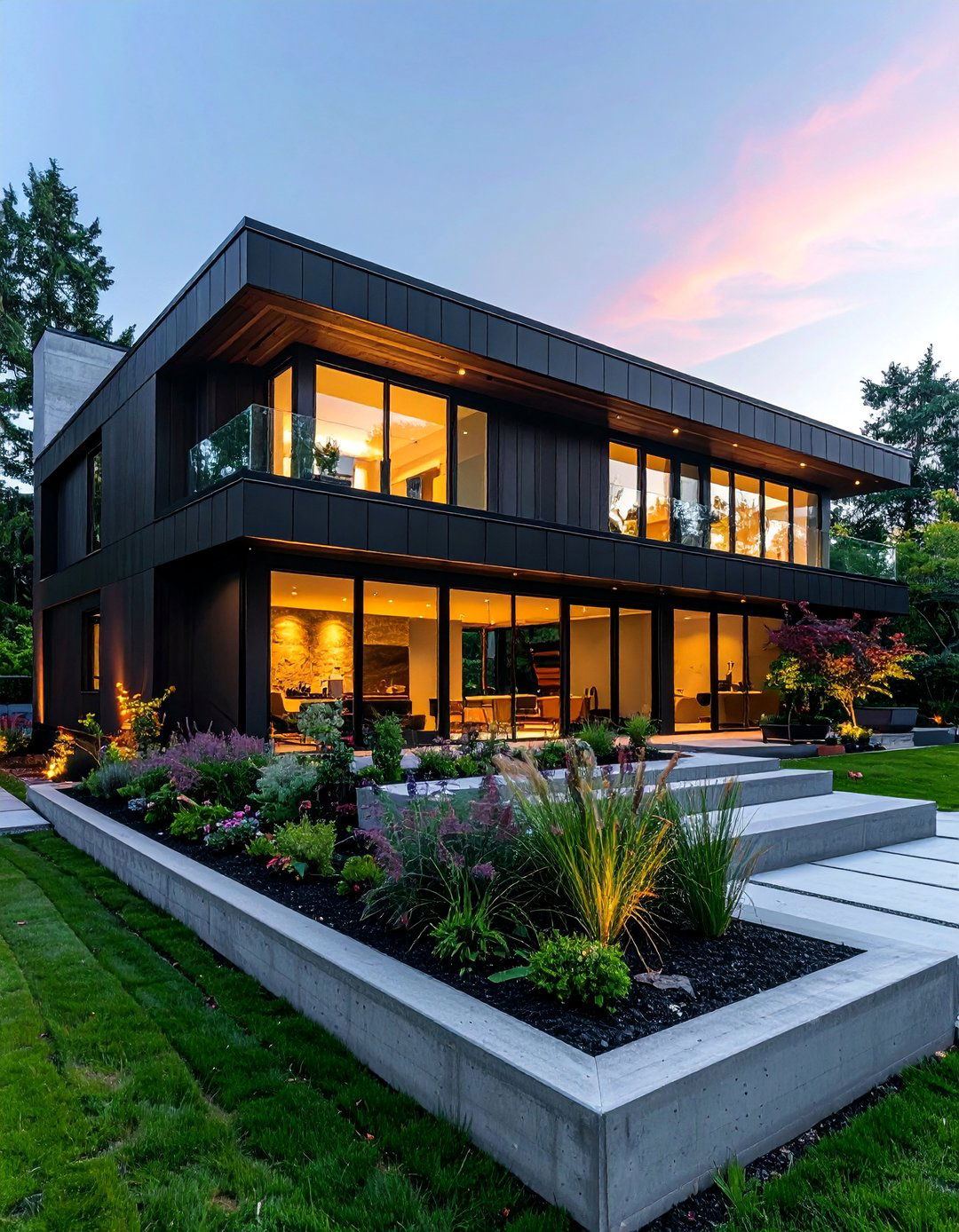
The combination of black siding with an exposed board-formed concrete foundation creates a raw, industrial, and highly contemporary look. The cool, utilitarian texture of the concrete provides a powerful contrast to the sleek finish of the black siding panels. This material pairing emphasizes a clean, minimalist aesthetic rooted in honesty of materials. The concrete not only grounds the structure visually but also adds a layer of textural interest at the base of the home. This approach is often seen in modern architectural designs that celebrate a blend of refined finishes and raw, elemental forms for a striking and sophisticated result.
26. Black Siding with a Pop of Greenery from Landscaping
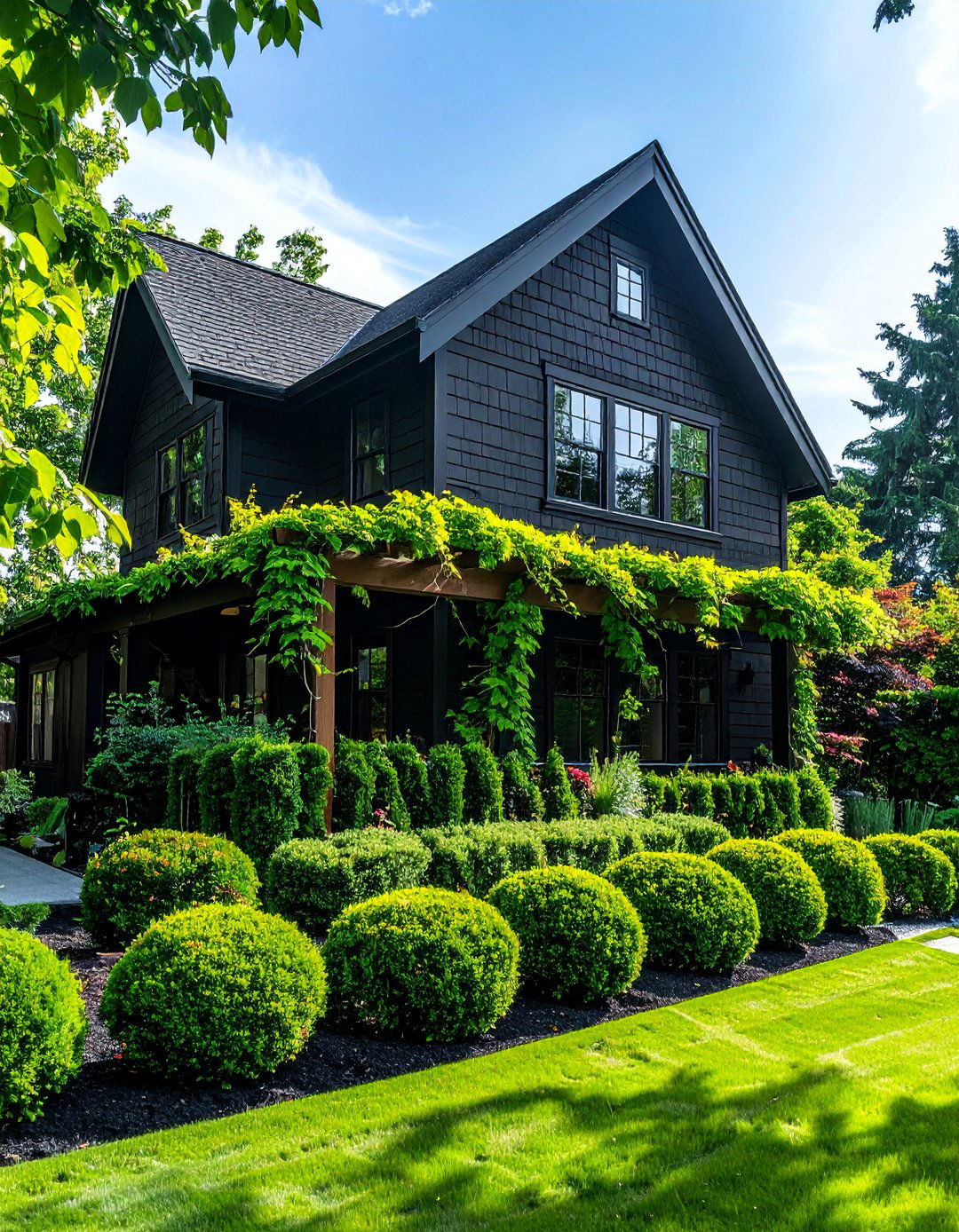
A black siding house serves as a perfect backdrop for vibrant green landscaping. The dark, neutral facade makes the colors of nature pop, from the bright green of a manicured lawn to the varied hues of shrubs, flowers, and climbing vines. Lush foliage, whether from trees, planter boxes, or a green wall, creates a stunning contrast that softens the bold exterior and connects the home to its environment. This intentional integration of landscape design is crucial for a black house, as the greenery adds life, color, and texture, preventing the facade from feeling too imposing and creating a beautiful, balanced composition.
27. Black Siding with a Covered Front Porch

A covered front porch on a black siding house creates a welcoming and functional transition from the outdoors to the interior. The dark siding gives the home a modern edge, while the porch adds a touch of traditional charm and comfort. To enhance the welcoming feel, the porch ceiling is often finished in a warm natural wood, which glows beautifully when lit at night. White or natural wood columns can frame the porch, providing a pleasing contrast to the black walls. This combination balances the bold statement of the black siding with the classic, inviting gesture of a front porch.
28. Black Siding with Black Window Frames
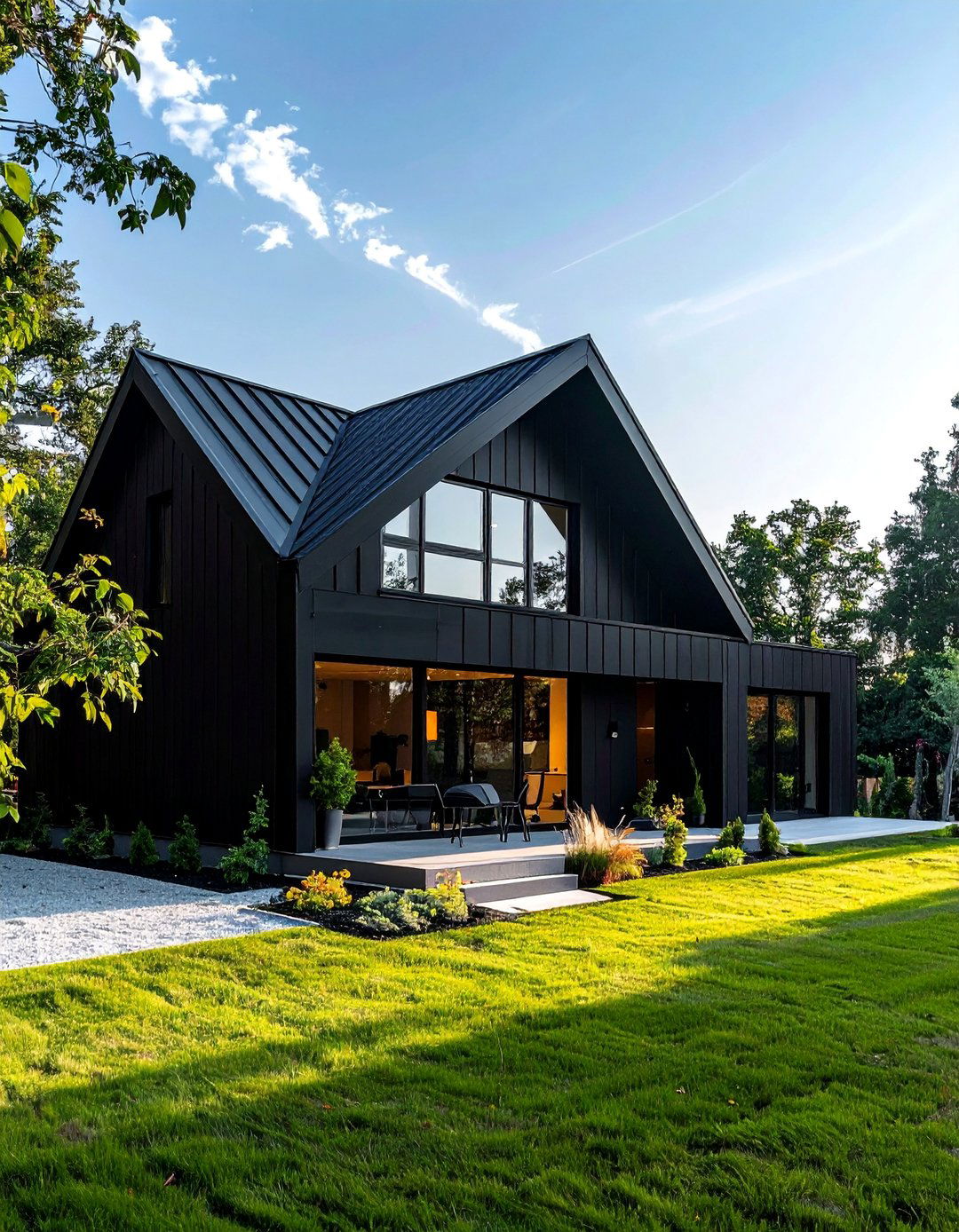
Pairing black siding with black window frames creates an exceptionally sleek, modern, and seamless exterior. This monochromatic choice minimizes the visual interruption of the window frames, allowing the glass itself to become the primary feature. The result is a clean, unified facade that emphasizes the home's overall form and the connection between the interior and the view outside. This "all-black" approach is a hallmark of minimalist design, where simplicity and cohesion are paramount. It gives the home a sophisticated, high-end, and custom-built appearance, focusing attention on architectural lines and the surrounding landscape reflected in the expansive glass.
29. Black Siding for an Urban Townhouse
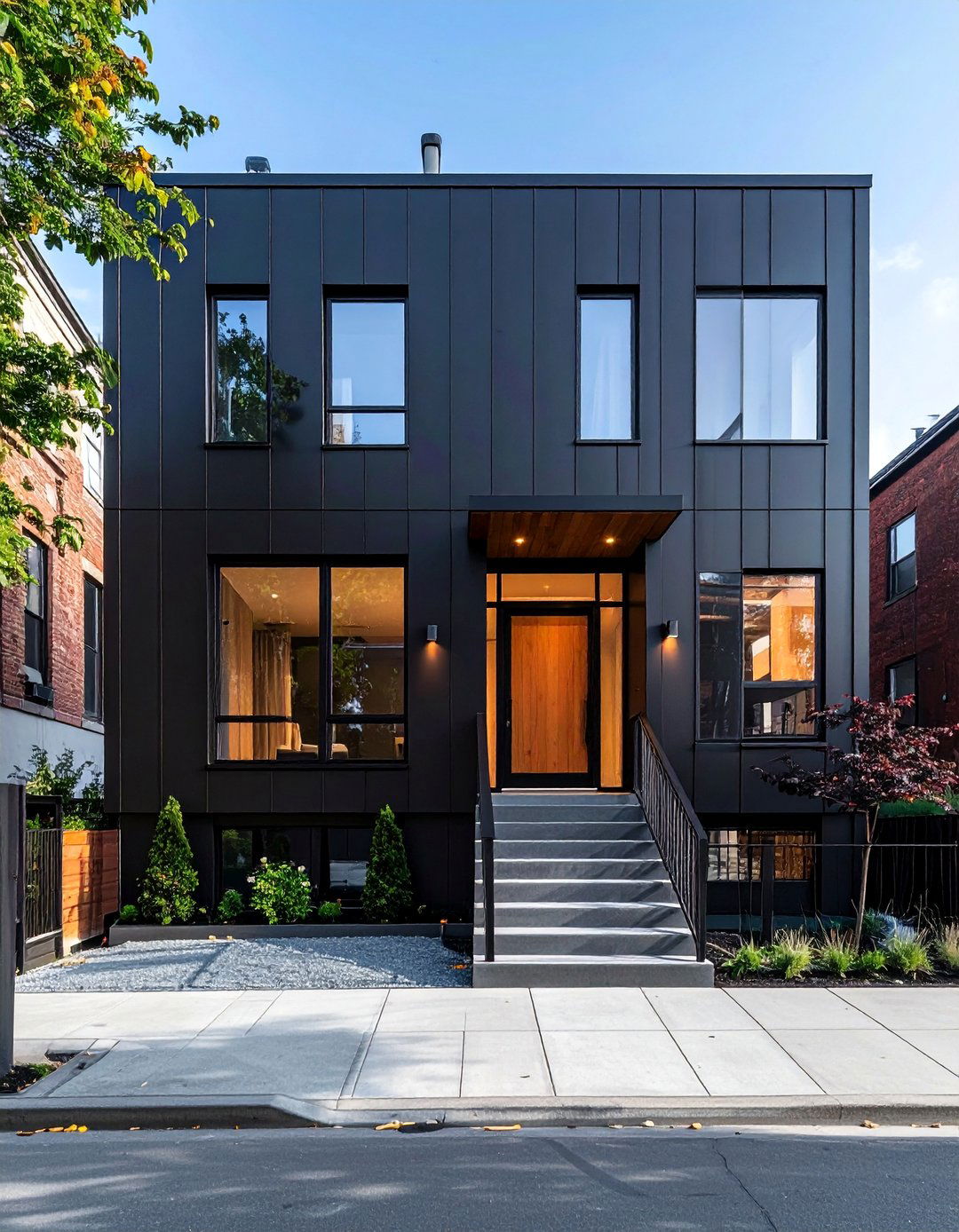
Using black siding on an urban townhouse is a surefire way to create a standout property in a dense city environment. The bold, dark color gives the home a sophisticated, contemporary presence that feels both private and chic. In a row of traditional brick or stone townhouses, a black facade offers a modern counterpoint that is both elegant and understated. Vertical siding can help to accentuate the height of the narrow structure, while large windows ensure the interior remains bright and airy. It's a design choice that signals modern luxury and architectural confidence in an urban setting.
30. Black Siding on a Shed or Accessory Dwelling Unit (ADU)
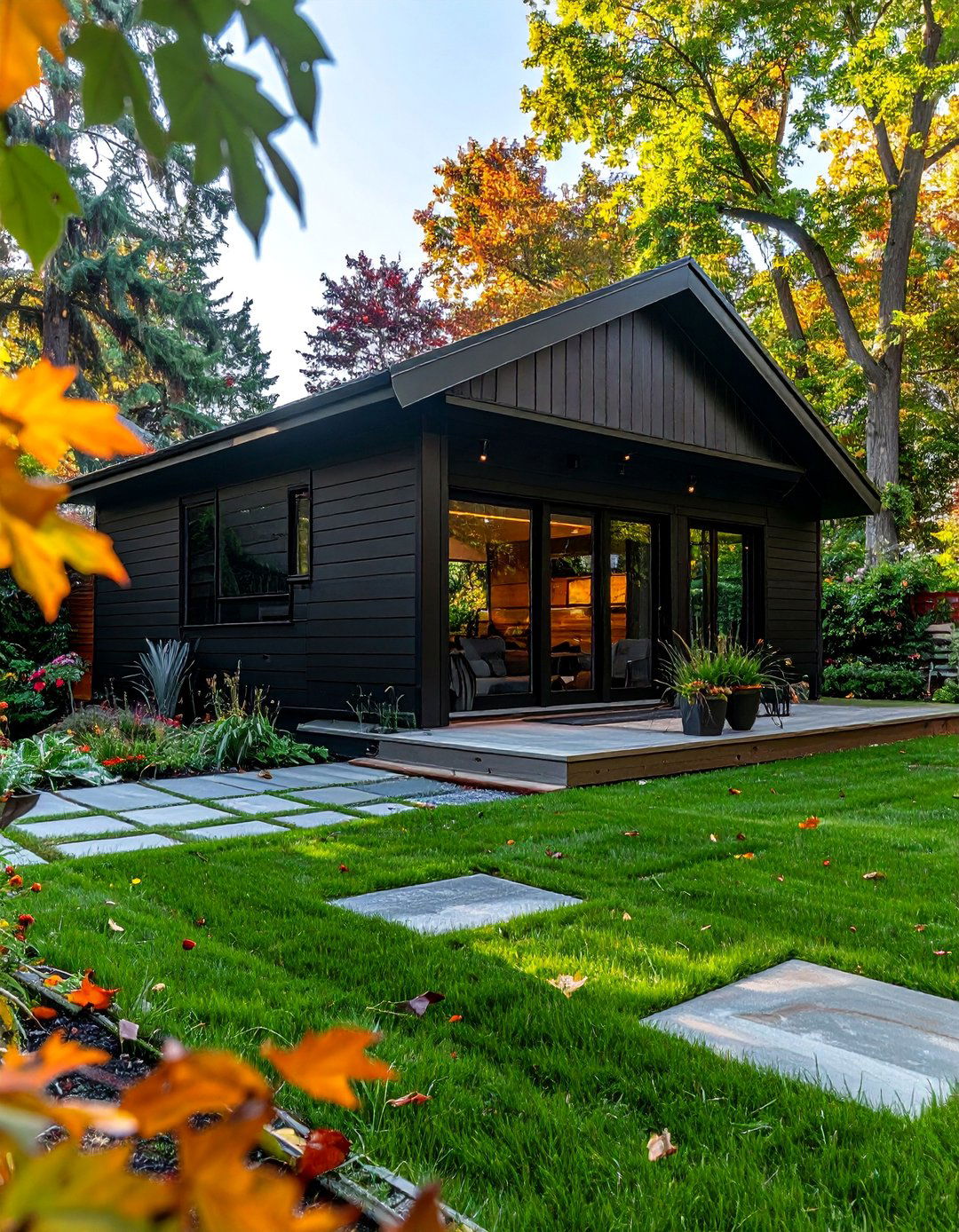
Applying black siding to a shed or an Accessory Dwelling Unit (ADU) is a great way to create a stylish and cohesive backyard space. Cladding the smaller structure in the same black siding as the main house establishes a clear visual connection and a unified design aesthetic across the property. Alternatively, a black ADU can serve as a dramatic, modern focal point in the backyard. The dark color helps the structure recede into the landscape, especially when surrounded by lush greenery. This choice elevates a simple outbuilding from a purely functional structure to a sophisticated architectural feature.
Conclusion:
Opting for a black siding house is a decisive move towards a sleek, modern, and enduringly stylish exterior. The versatility of black allows it to complement a vast range of architectural styles, from rustic farmhouses to minimalist contemporary designs. By thoughtfully pairing it with materials like wood, stone, and metal, or accenting it with bold colors and strategic lighting, homeowners can create a unique and personalized statement. Black siding not only enhances curb appeal but also provides a dramatic backdrop that celebrates both architectural form and the surrounding natural landscape, proving its place as a sophisticated and timeless choice.

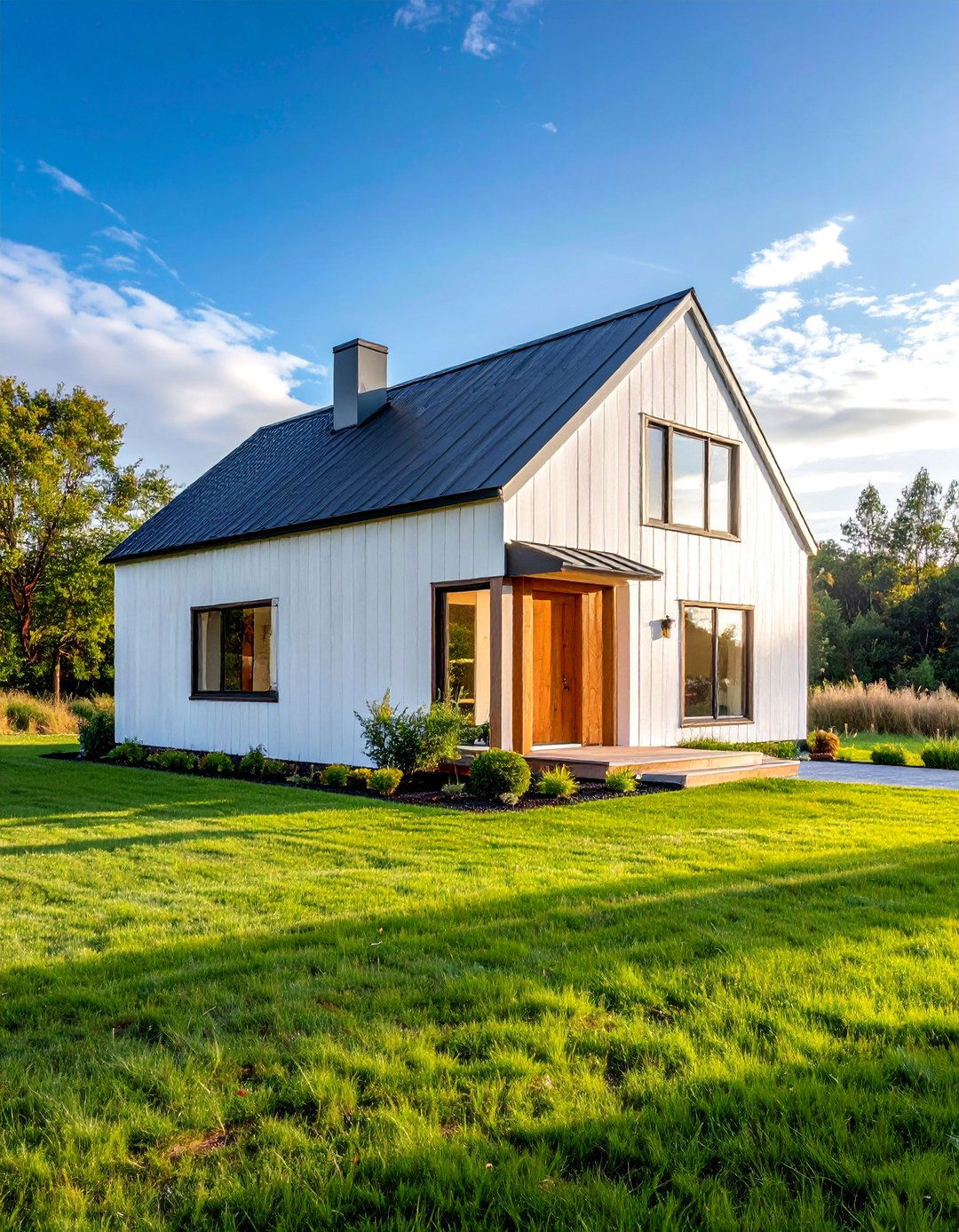
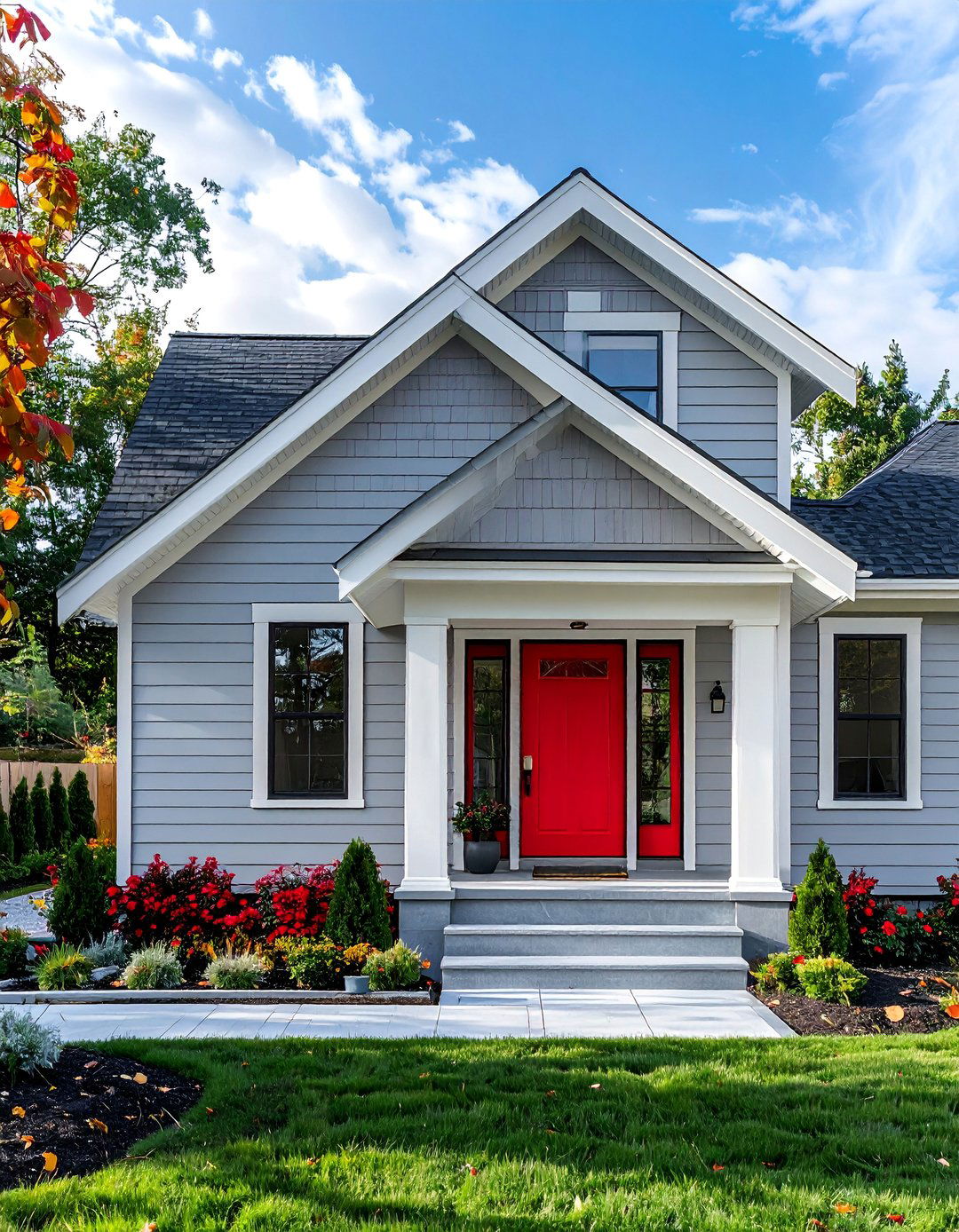
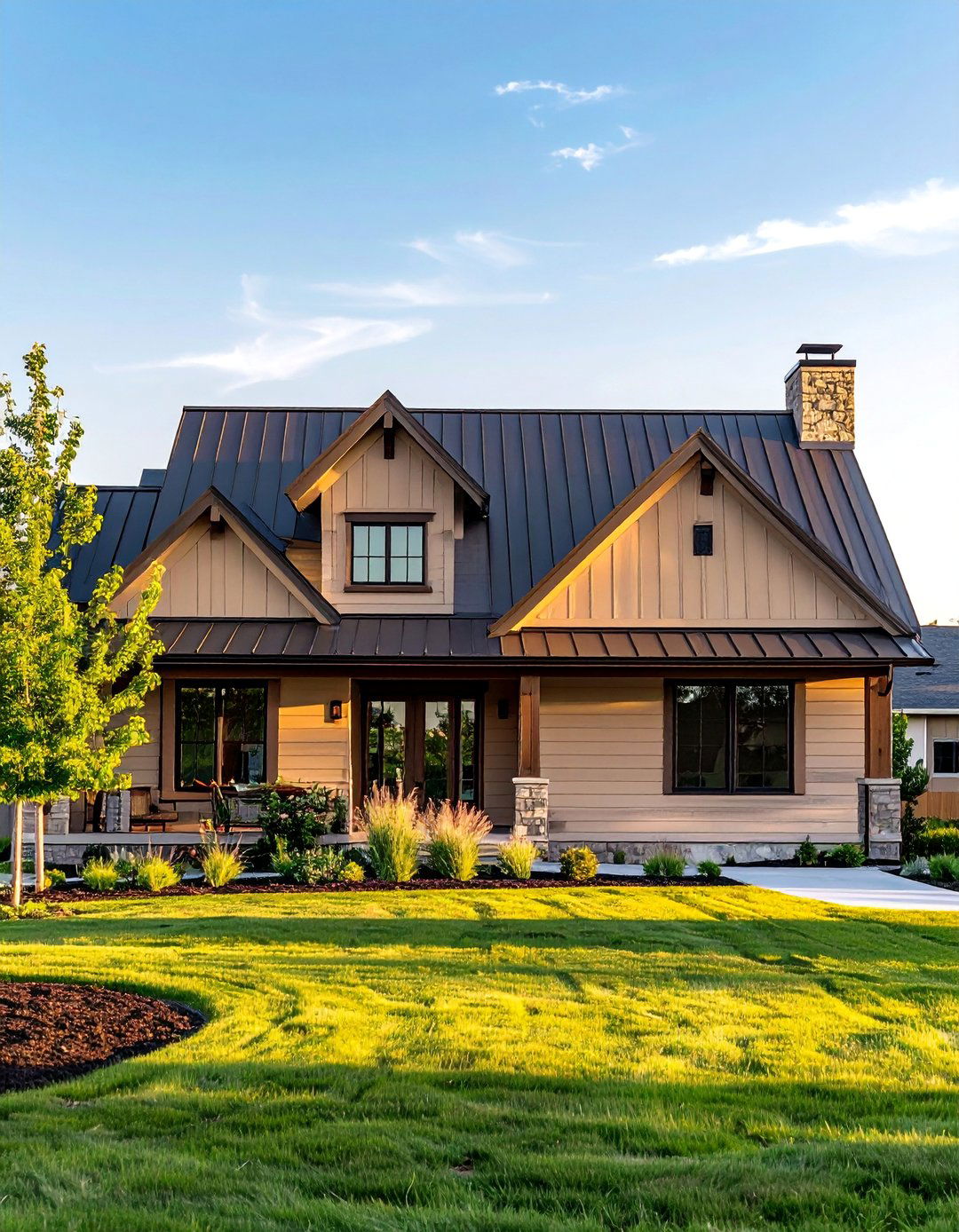
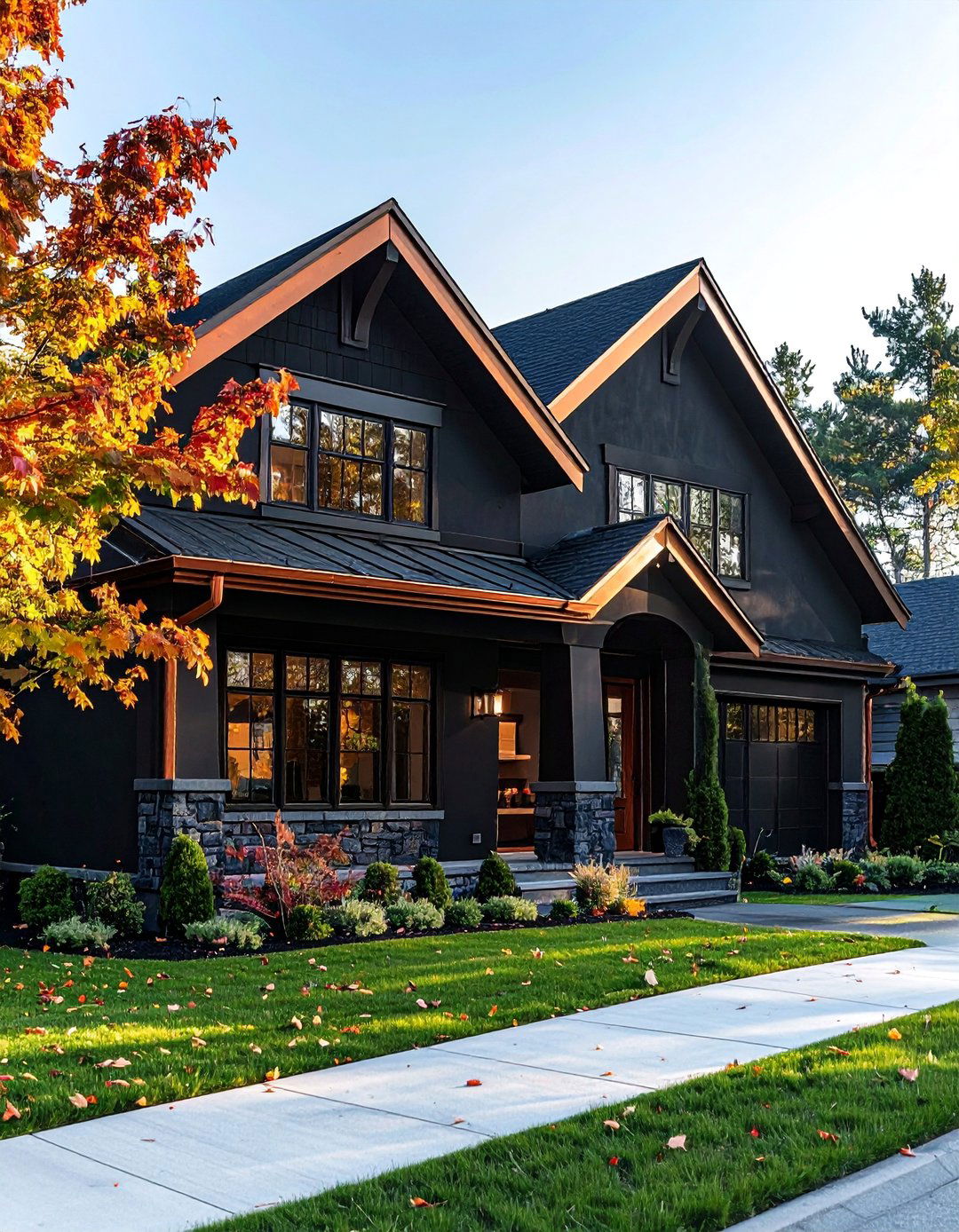
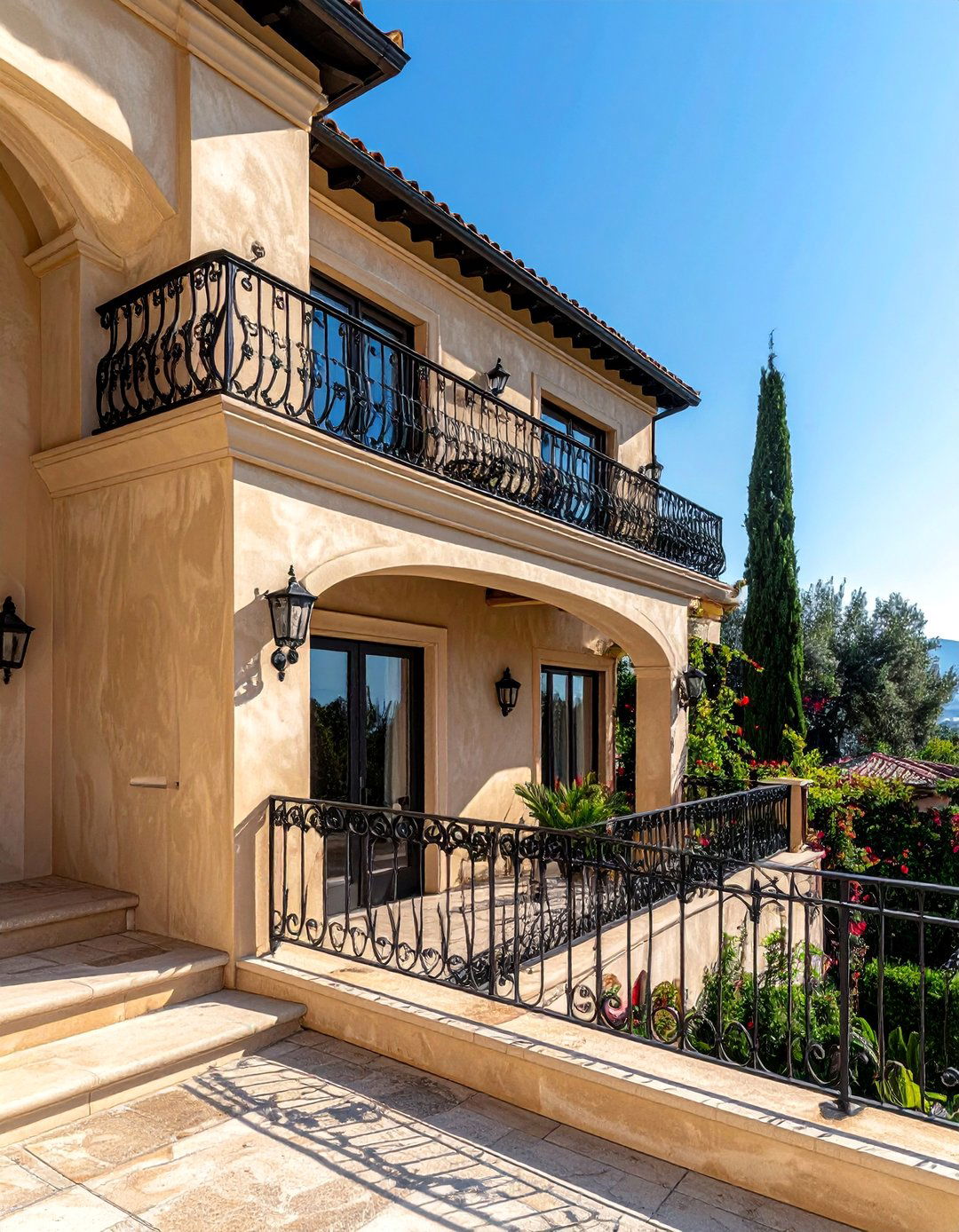
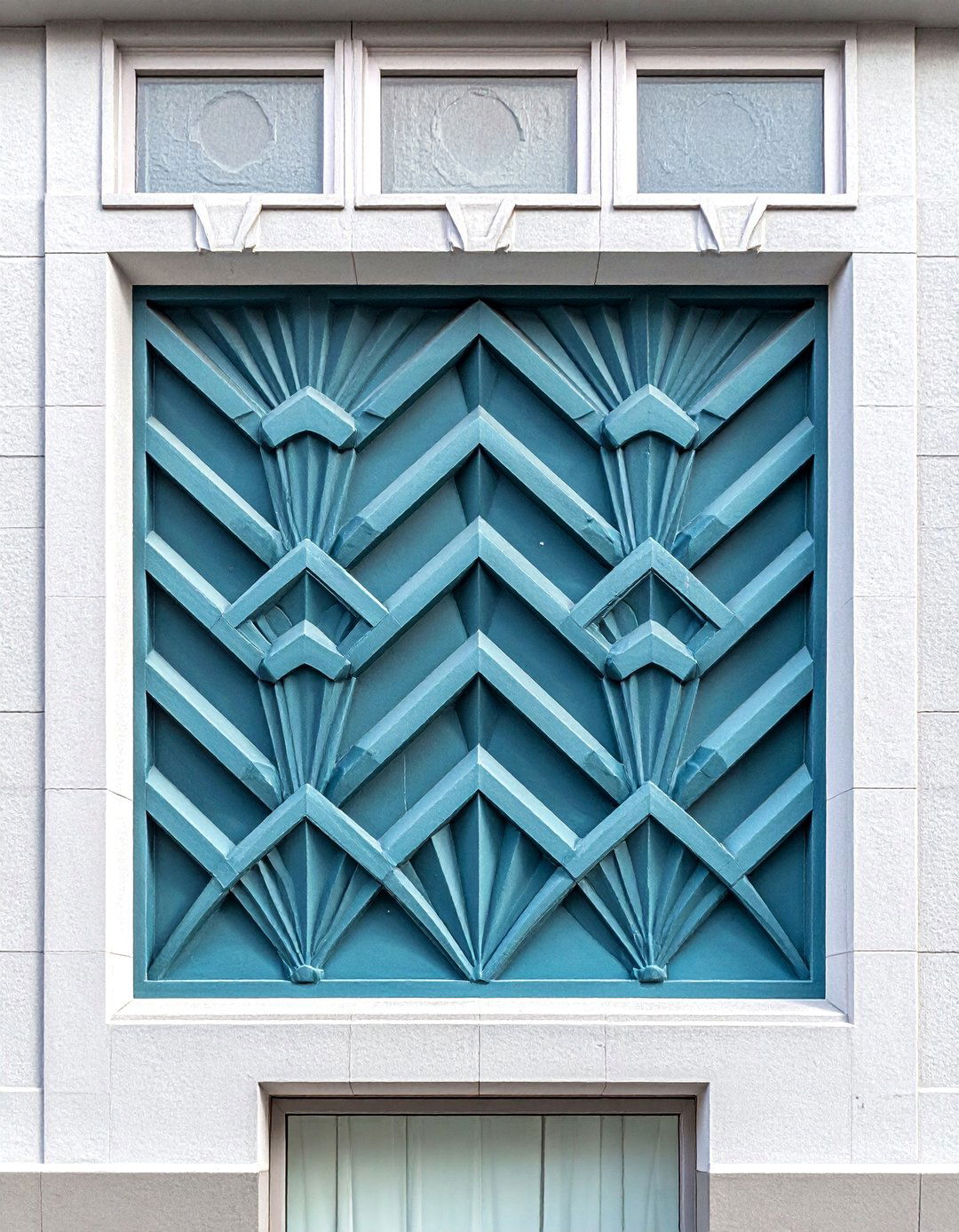
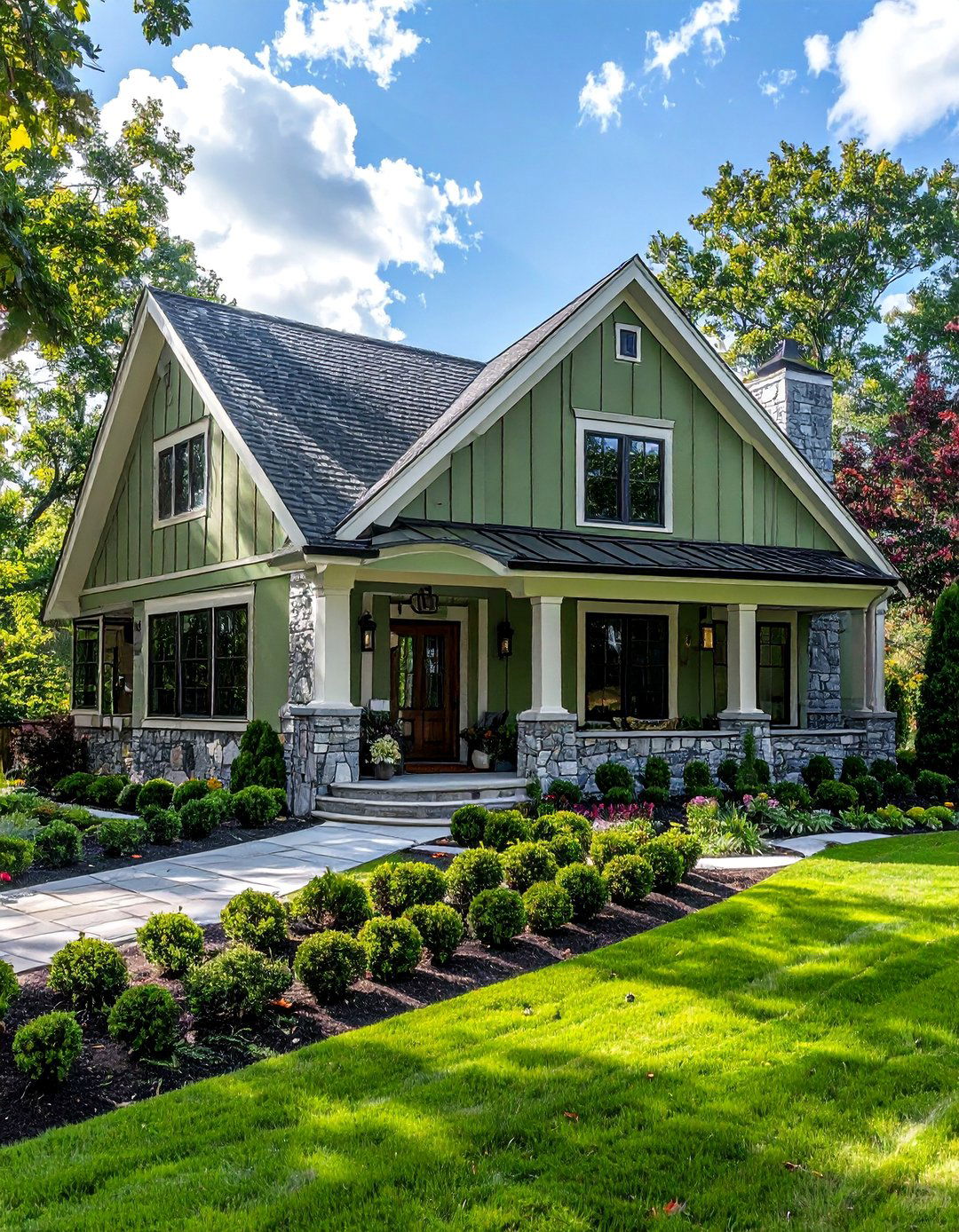
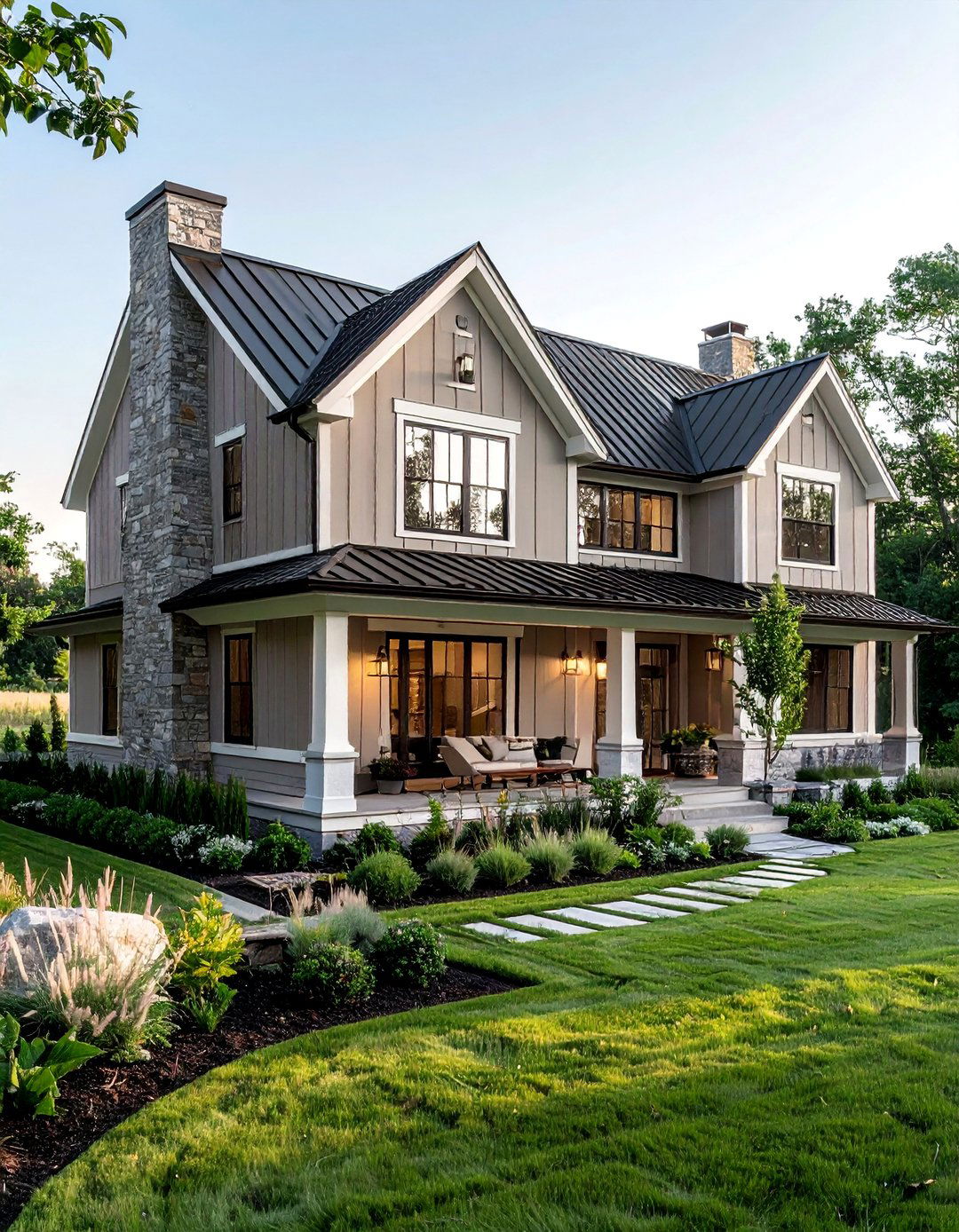
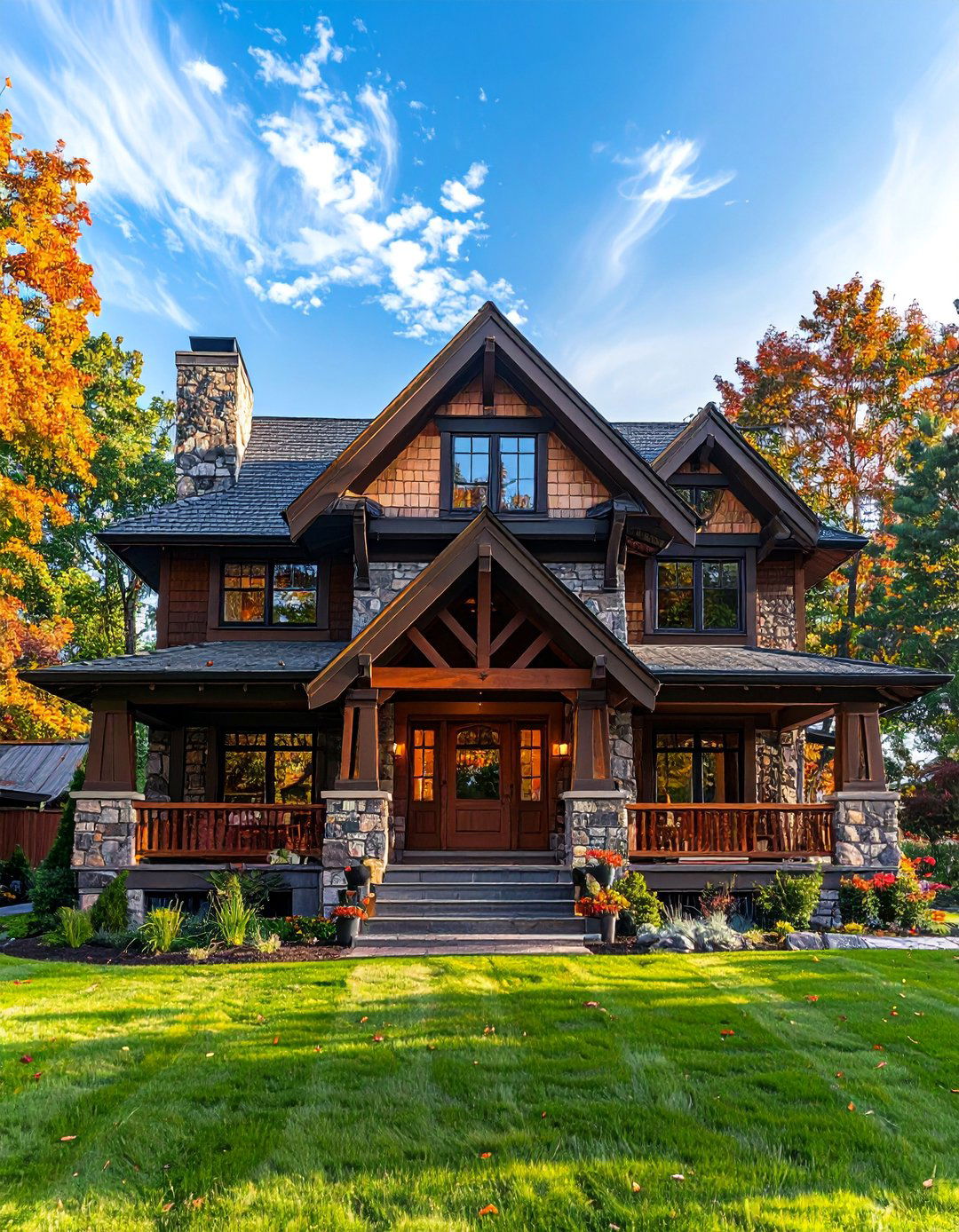
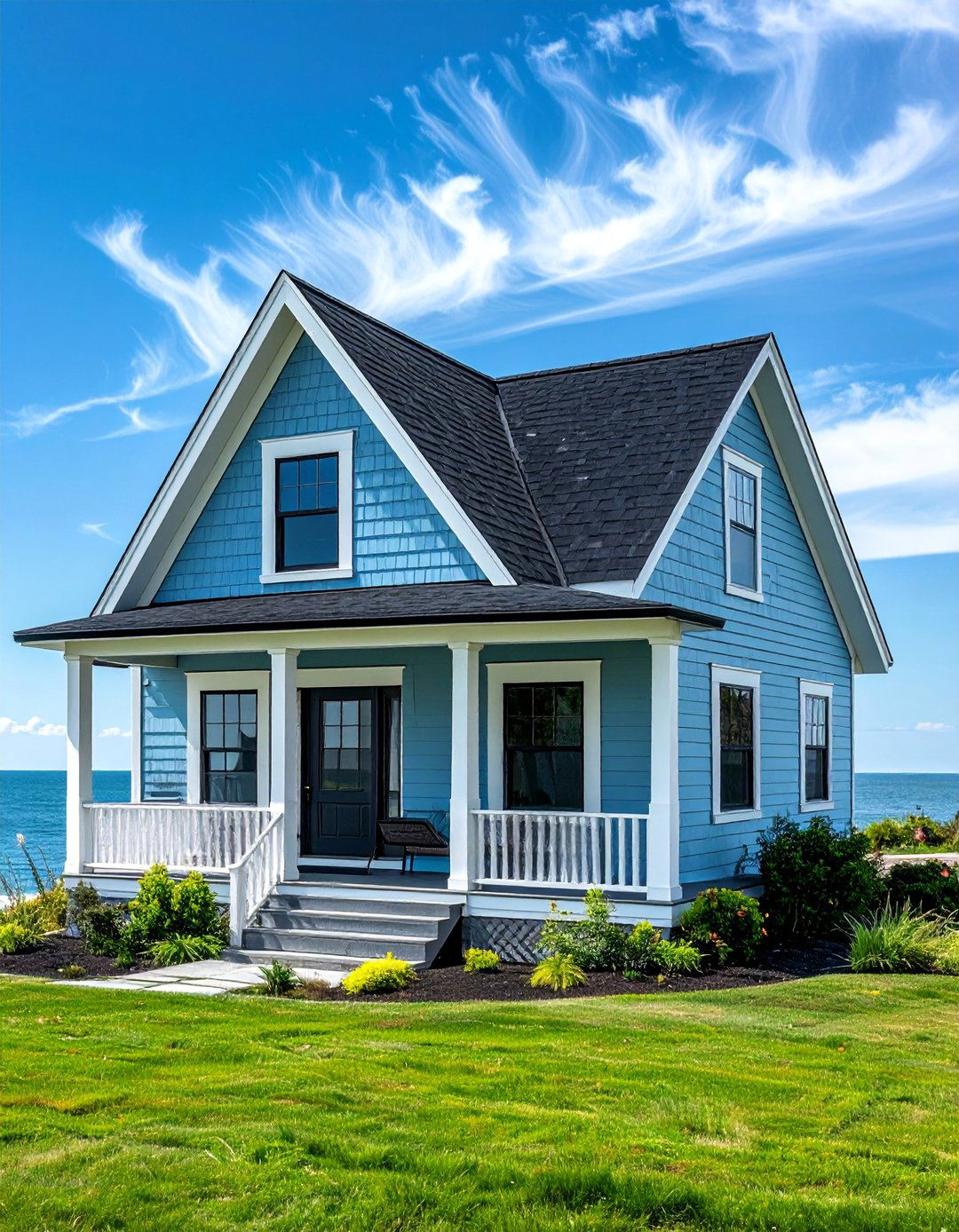
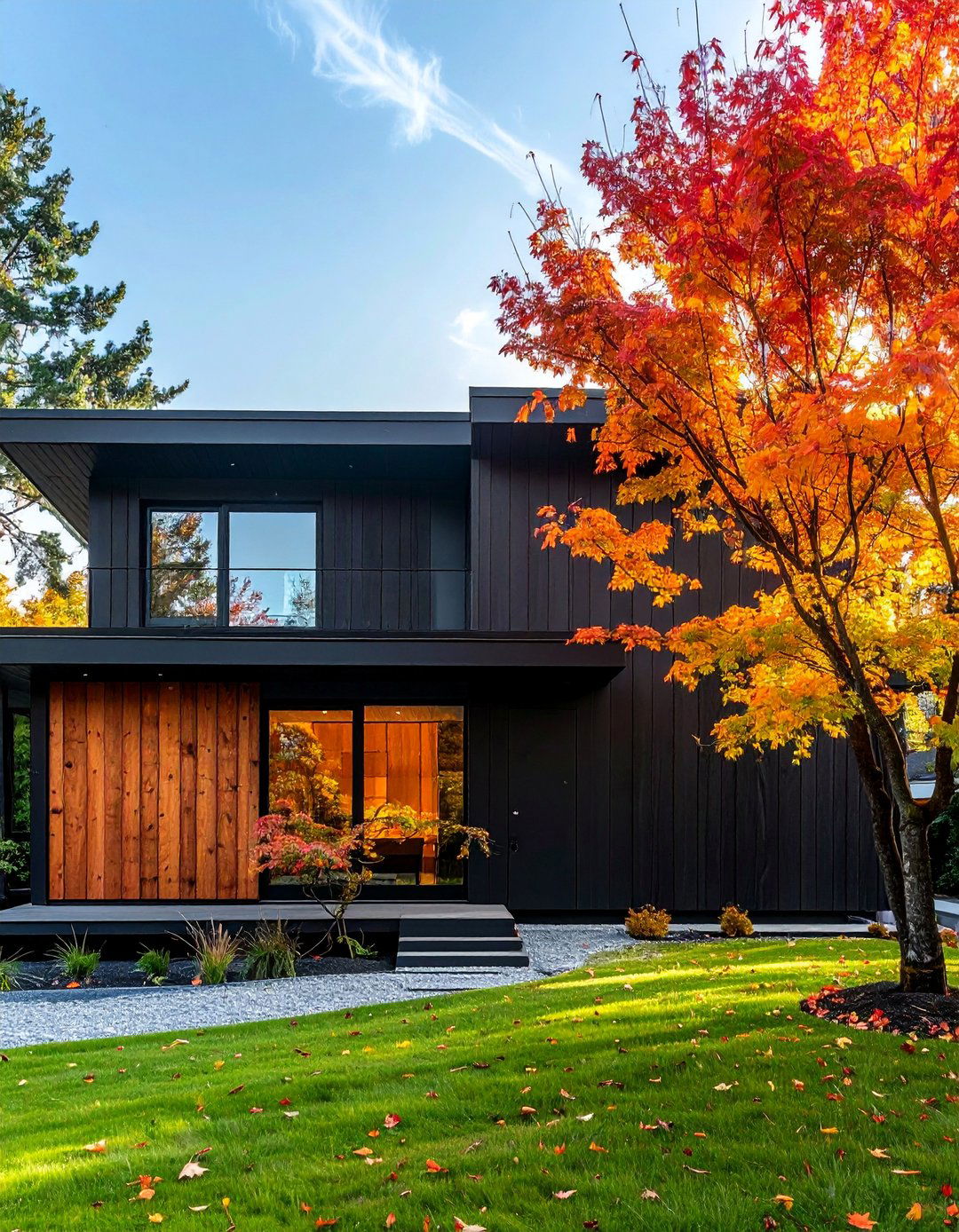
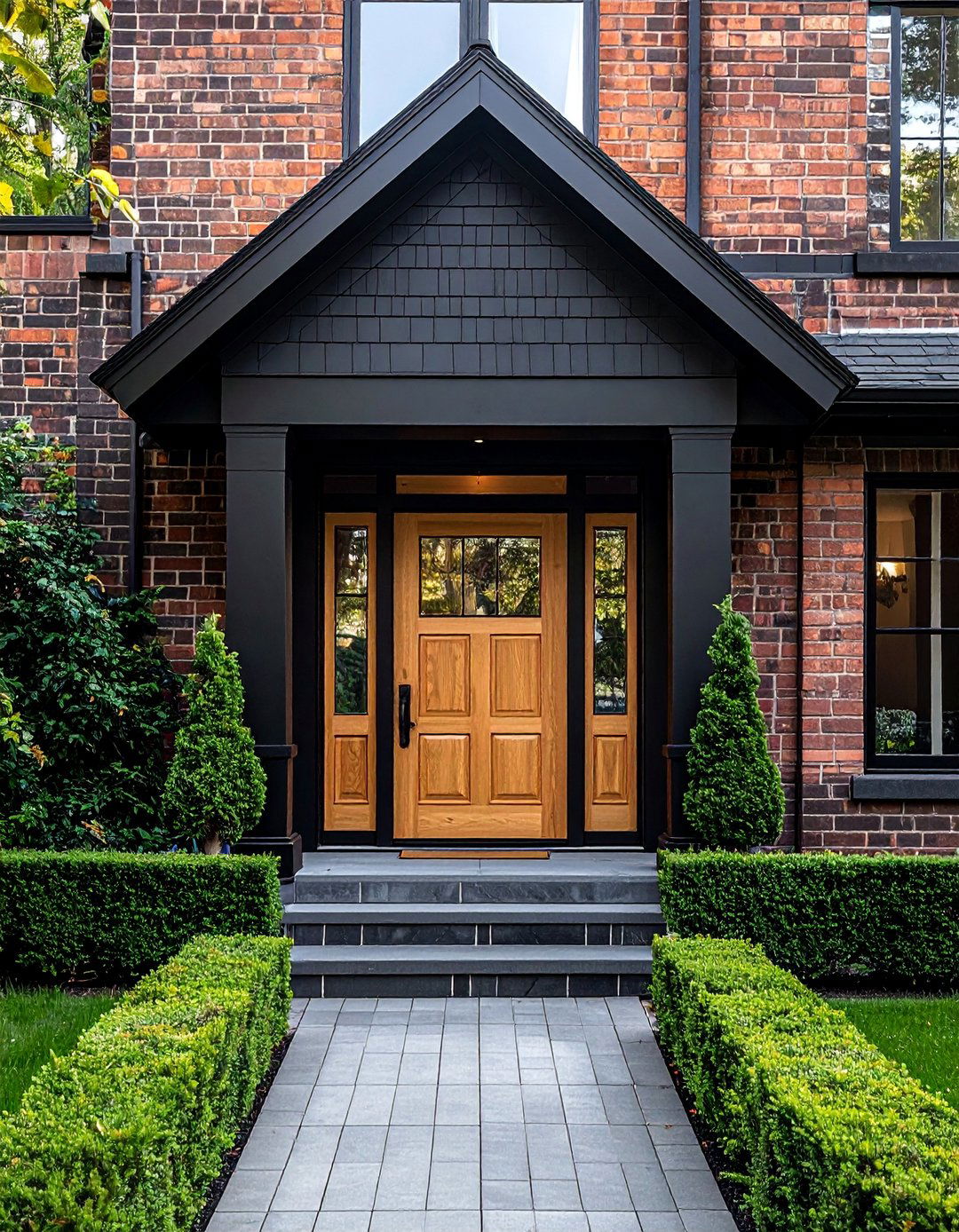
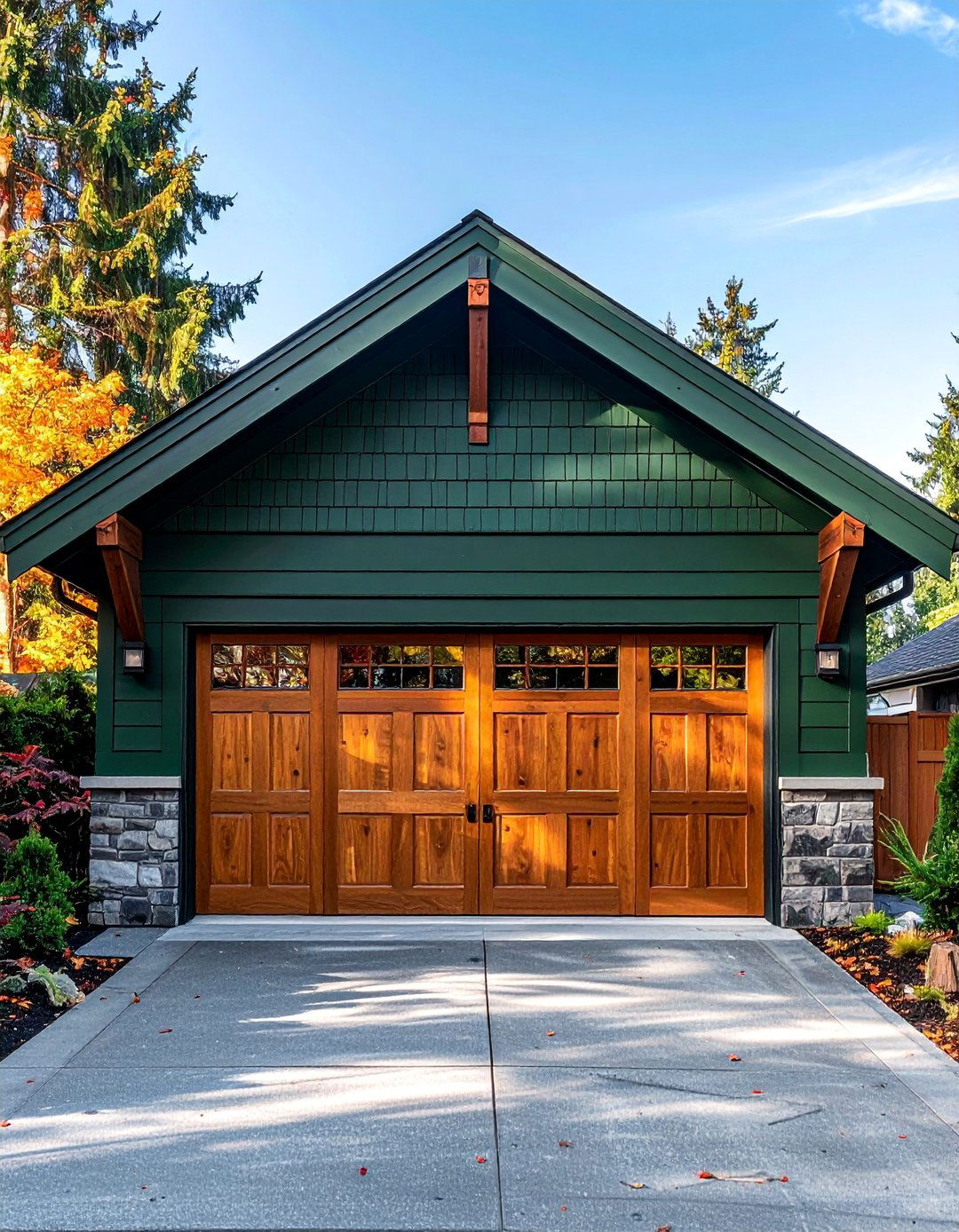
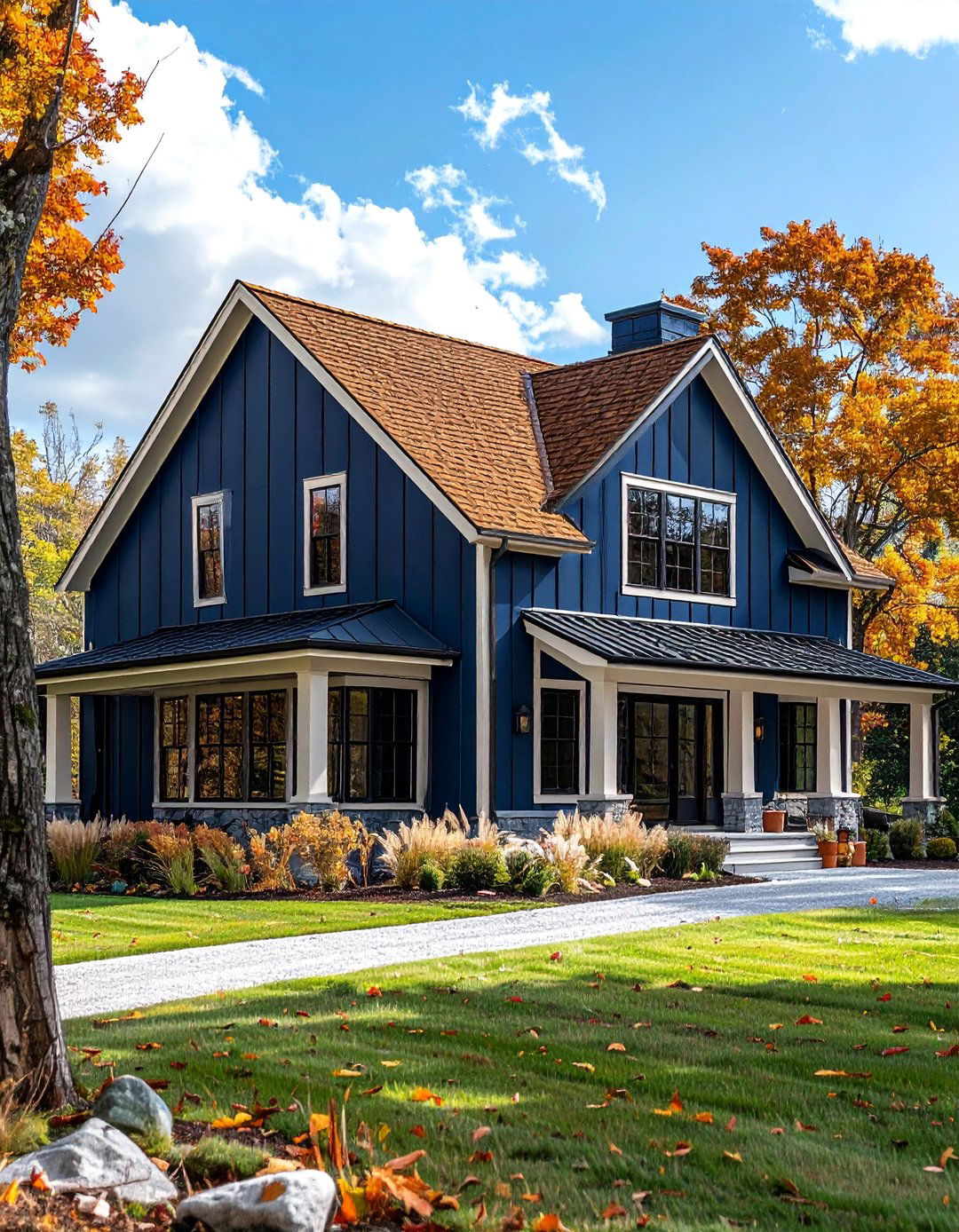
Leave a Reply